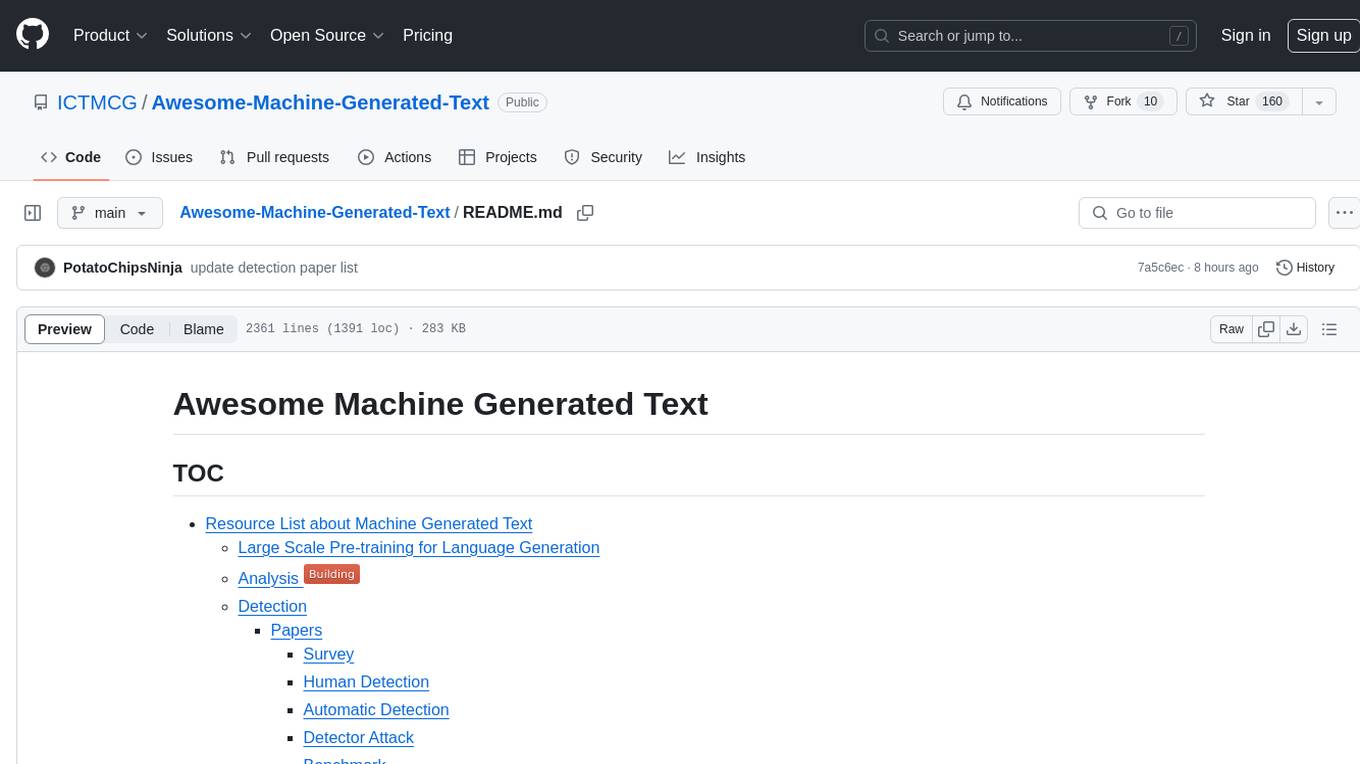
AI-System-School
🚀 AI System Papers and Industry Practice. ⚡️ System for Machine Learning, LLM (Large Language Model), GenAI (Generative AI). 🍻 OSDI, NSDI, SIGCOMM, SoCC, MLSys, etc. 🗃️ Llama3, Mistral, etc. 🧑💻 Video Tutorials.
Stars: 2569
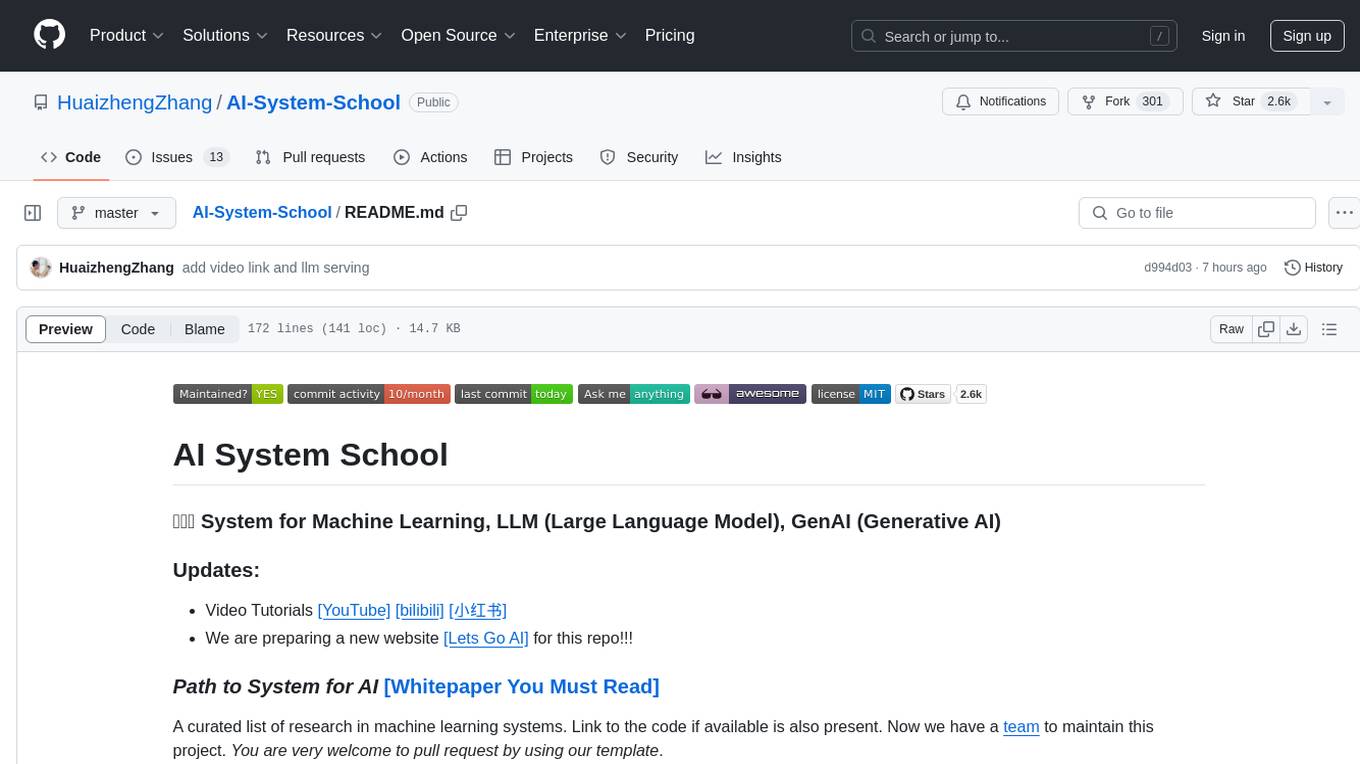
AI System School is a curated list of research in machine learning systems, focusing on ML/DL infra, LLM infra, domain-specific infra, ML/LLM conferences, and general resources. It provides resources such as data processing, training systems, video systems, autoML systems, and more. The repository aims to help users navigate the landscape of AI systems and machine learning infrastructure, offering insights into conferences, surveys, books, videos, courses, and blogs related to the field.
README:
- Video Tutorials [YouTube] [bilibili] [小红书]
- We are preparing a new website [Lets Go AI] for this repo!!!
Path to System for AI [Whitepaper You Must Read]
A curated list of research in machine learning systems. Link to the code if available is also present. Now we have a team to maintain this project. You are very welcome to pull request by using our template.
- Video System
- AutoML System
- Edge AI
- GNN System
- Federated Learning System
- Deep Reinforcement Learning System
- OSDI
- SOSP
- SIGCOMM
- NSDI
- MLSys
- ATC
- Eurosys
- Middleware
- SoCC
- TinyML
- Toward Highly Available, Intelligent Cloud and ML Systems [Slide]
- A curated list of awesome System Designing articles, videos and resources for distributed computing, AKA Big Data. [GitHub]
- awesome-production-machine-learning: A curated list of awesome open source libraries to deploy, monitor, version and scale your machine learning [GitHub]
- Opportunities and Challenges Of Machine Learning Accelerators In Production [Paper]
- Ananthanarayanan, Rajagopal, et al. "
- 2019 {USENIX} Conference on Operational Machine Learning (OpML 19). 2019.
- How (and How Not) to Write a Good Systems Paper [Advice]
- Applied machine learning at Facebook: a datacenter infrastructure perspective [Paper]
- Hazelwood, Kim, et al. (HPCA 2018)
- Infrastructure for Usable Machine Learning: The Stanford DAWN Project
- Bailis, Peter, Kunle Olukotun, Christopher Ré, and Matei Zaharia. (preprint 2017)
- Hidden technical debt in machine learning systems [Paper]
- Sculley, David, et al. (NIPS 2015)
- End-to-end arguments in system design [Paper]
- Saltzer, Jerome H., David P. Reed, and David D. Clark.
- System Design for Large Scale Machine Learning [Thesis]
- Deep Learning Inference in Facebook Data Centers: Characterization, Performance Optimizations and Hardware Implications [Paper]
- Park, Jongsoo, Maxim Naumov, Protonu Basu et al. arXiv 2018
- Summary: This paper presents a characterizations of DL models and then shows the new design principle of DL hardware.
- A Berkeley View of Systems Challenges for AI [Paper]
- Computer Architecture: A Quantitative Approach [Must read]
- Distributed Machine Learning Patterns [Website]
- Streaming Systems [Book]
- Kubernetes in Action (start to read) [Book]
- Machine Learning Systems: Designs that scale [Website]
- Trust in Machine Learning [Website]
- Automated Machine Learning in Action [Website]
- ScalaDML2020: Learn from the best minds in the machine learning community. [Video]
- Jeff Dean: "Achieving Rapid Response Times in Large Online Services" Keynote - Velocity 2014 [YouTube]
- From Research to Production with PyTorch [Video]
- Introduction to Microservices, Docker, and Kubernetes [YouTube]
- ICML Keynote: Lessons Learned from Helping 200,000 non-ML experts use ML [Video]
- Adaptive & Multitask Learning Systems [Website]
- System thinking. A TED talk. [YouTube]
- Flexible systems are the next frontier of machine learning. Jeff Dean [YouTube]
- Is It Time to Rewrite the Operating System in Rust? [YouTube]
- InfoQ: AI, ML and Data Engineering [YouTube]
- Start to watch.
- Netflix: Human-centric Machine Learning Infrastructure [InfoQ]
- SysML 2019: [YouTube]
- ScaledML 2019: David Patterson, Ion Stoica, Dawn Song and so on [YouTube]
- ScaledML 2018: Jeff Dean, Ion Stoica, Yangqing Jia and so on [YouTube] [Slides]
- A New Golden Age for Computer Architecture History, Challenges, and Opportunities. David Patterson [YouTube]
- How to Have a Bad Career. David Patterson (I am a big fan) [YouTube]
- SysML 18: Perspectives and Challenges. Michael Jordan [YouTube]
- SysML 18: Systems and Machine Learning Symbiosis. Jeff Dean [YouTube]
- AutoML Basics: Automated Machine Learning in Action. Qingquan Song, Haifeng Jin, Xia Hu [YouTube]
- CS692 Seminar: Systems for Machine Learning, Machine Learning for Systems [GitHub]
- Topics in Networks: Machine Learning for Networking and Systems, Autumn 2019 [Course Website]
- CS6465: Emerging Cloud Technologies and Systems Challenges [Cornell]
- CS294: AI For Systems and Systems For AI. [UC Berkeley Spring] (Strong Recommendation) [Machine Learning Systems (Fall 2019)]
- CSE 599W: System for ML. [Chen Tianqi] [University of Washington]
- EECS 598: Systems for AI (W'21). [Mosharaf Chowdhury] [Systems for AI (W'21)]
- Tutorial code on how to build your own Deep Learning System in 2k Lines [GitHub]
- CSE 291F: Advanced Data Analytics and ML Systems. [UCSD]
- CSci 8980: Machine Learning in Computer Systems [University of Minnesota, Twin Cities]
- Mu Li (MxNet, Parameter Server): Introduction to Deep Learning [Best DL Course I think] [Book]
- 10-605: Machine Learning with Large Datasets. [CMU]
- CS 329S: Machine Learning Systems Design. [Stanford]
- Parallelizing across multiple CPU/GPUs to speed up deep learning inference at the edge [Amazon Blog]
- Building Robust Production-Ready Deep Learning Vision Models in Minutes [Blog]
- Deploy Machine Learning Models with Keras, FastAPI, Redis and Docker [Blog]
- How to Deploy a Machine Learning Model -- Creating a production-ready API using FastAPI + Uvicorn [Blog] [GitHub]
- Deploying a Machine Learning Model as a REST API [Blog]
- Continuous Delivery for Machine Learning [Blog]
- Kubernetes CheatSheets In A4 [GitHub]
- A Gentle Introduction to Kubernetes [Blog]
- Train and Deploy Machine Learning Model With Web Interface - Docker, PyTorch & Flask [GitHub]
- Learning Kubernetes, The Chinese Taoist Way [GitHub]
- Data pipelines, Luigi, Airflow: everything you need to know [Blog]
- The Deep Learning Toolset — An Overview [Blog]
- Summary of CSE 599W: Systems for ML [Chinese Blog]
- Polyaxon, Argo and Seldon for Model Training, Package and Deployment in Kubernetes [Blog]
- Overview of the different approaches to putting Machine Learning (ML) models in production [Blog]
- Being a Data Scientist does not make you a Software Engineer [Part1] Architecting a Machine Learning Pipeline [Part2]
- Model Serving in PyTorch [Blog]
- Machine learning in Netflix [Medium]
- SciPy Conference Materials (slides, repo) [GitHub]
- 继Spark之后,UC Berkeley 推出新一代AI计算引擎——Ray [Blog]
- 了解/从事机器学习/深度学习系统相关的研究需要什么样的知识结构? [Zhihu]
- Learn Kubernetes in Under 3 Hours: A Detailed Guide to Orchestrating Containers [Blog] [GitHub]
- data-engineer-roadmap: Learning from multiple companies in Silicon Valley. Netflix, Facebook, Google, Startups [GitHub]
- TensorFlow Serving + Docker + Tornado机器学习模型生产级快速部署 [Blog]
- Deploying a Machine Learning Model as a REST API [Blog]
- Colossal-AI: A Unified Deep Learning System for Big Model Era [Blog] [GitHub]
- Data Engineer Roadmap [Scaler Blogs]
For Tasks:
Click tags to check more tools for each tasksFor Jobs:
Alternative AI tools for AI-System-School
Similar Open Source Tools

AI-System-School
AI System School is a curated list of research in machine learning systems, focusing on ML/DL infra, LLM infra, domain-specific infra, ML/LLM conferences, and general resources. It provides resources such as data processing, training systems, video systems, autoML systems, and more. The repository aims to help users navigate the landscape of AI systems and machine learning infrastructure, offering insights into conferences, surveys, books, videos, courses, and blogs related to the field.
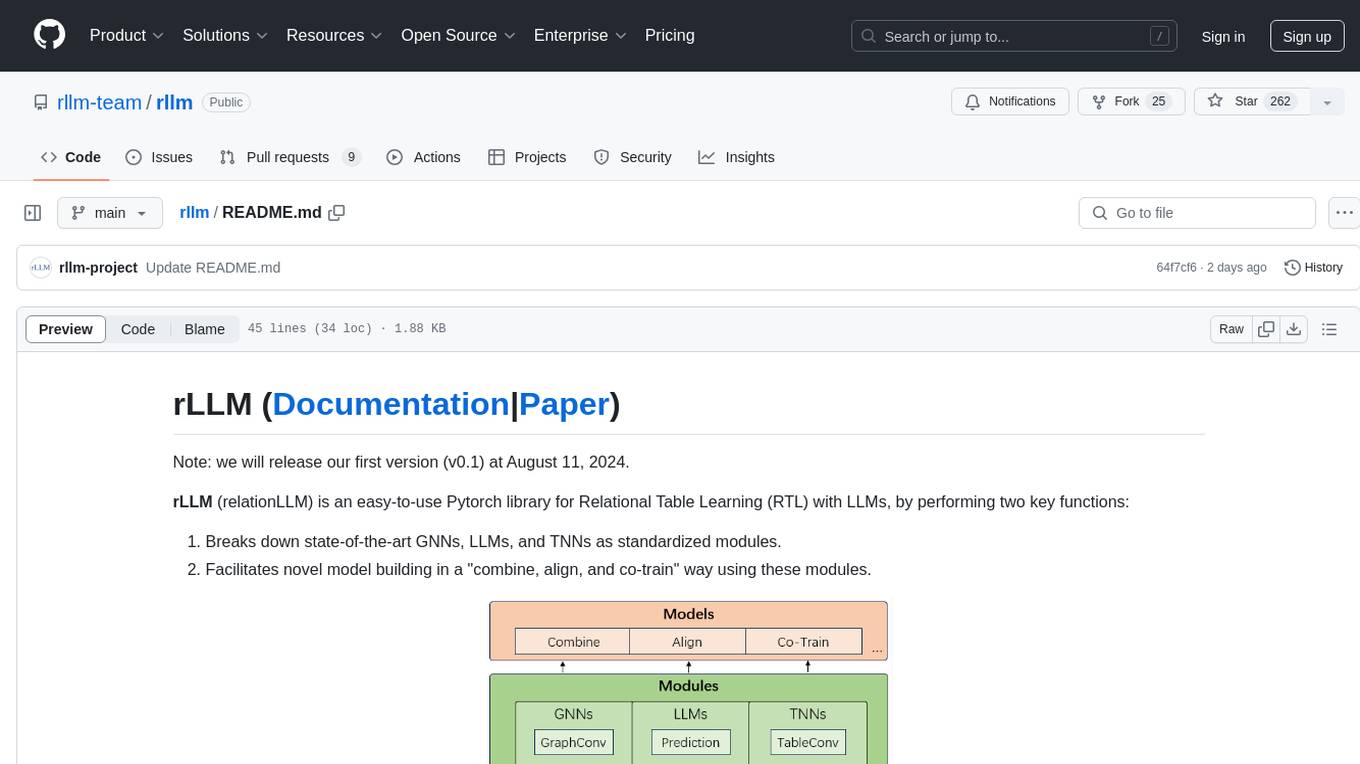
rllm
rLLM (relationLLM) is a Pytorch library for Relational Table Learning (RTL) with LLMs. It breaks down state-of-the-art GNNs, LLMs, and TNNs as standardized modules and facilitates novel model building in a 'combine, align, and co-train' way using these modules. The library is LLM-friendly, processes various graphs as multiple tables linked by foreign keys, introduces new relational table datasets, and is supported by students and teachers from Shanghai Jiao Tong University and Tsinghua University.
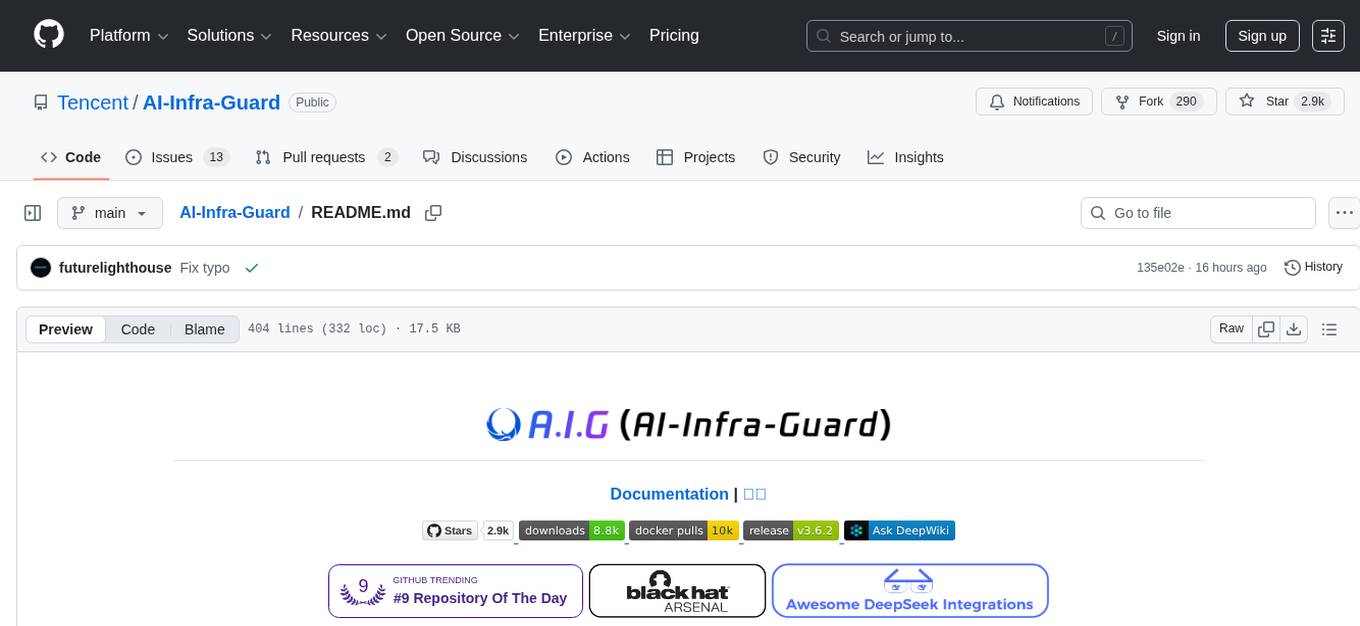
AI-Infra-Guard
A.I.G (AI-Infra-Guard) is an AI red teaming platform by Tencent Zhuque Lab that integrates capabilities such as AI infra vulnerability scan, MCP Server risk scan, and Jailbreak Evaluation. It aims to provide users with a comprehensive, intelligent, and user-friendly solution for AI security risk self-examination. The platform offers features like AI Infra Scan, AI Tool Protocol Scan, and Jailbreak Evaluation, along with a modern web interface, complete API, multi-language support, cross-platform deployment, and being free and open-source under the MIT license.
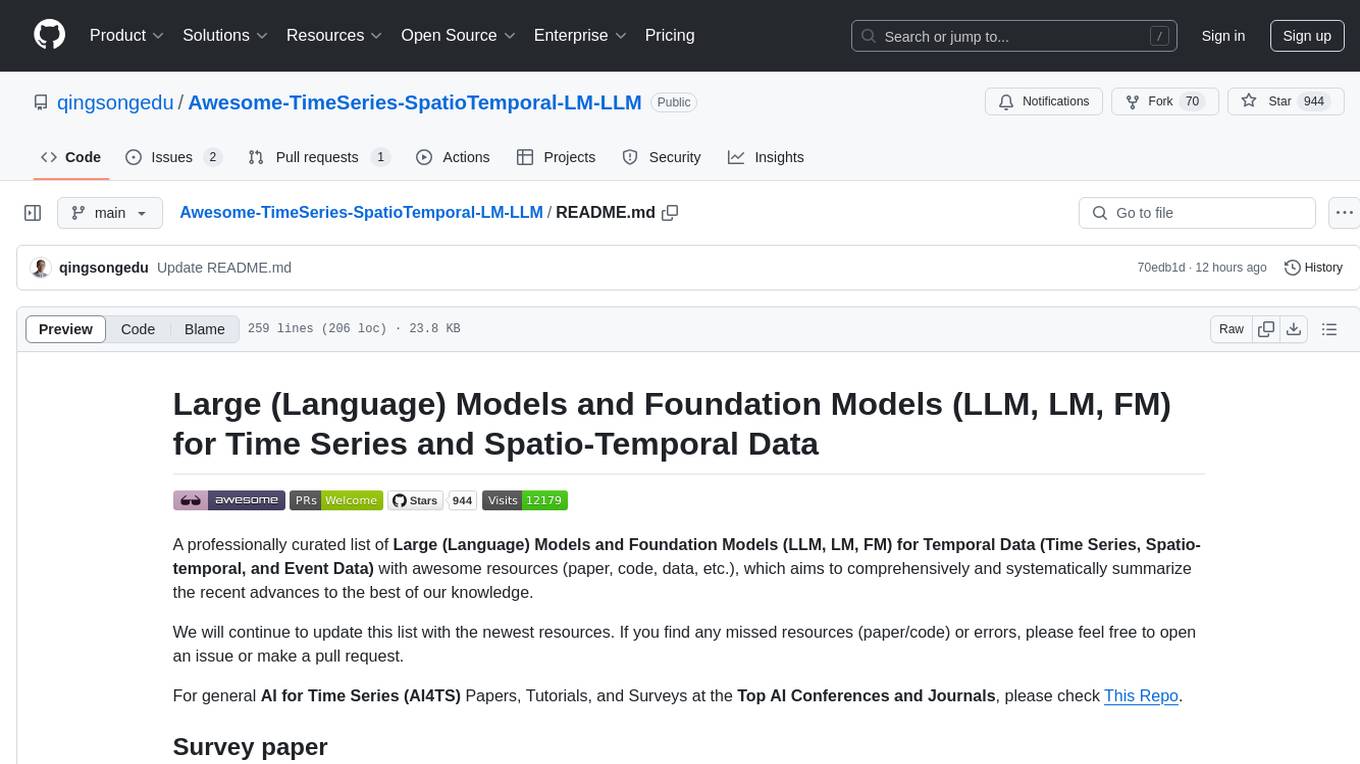
Awesome-TimeSeries-SpatioTemporal-LM-LLM
Awesome-TimeSeries-SpatioTemporal-LM-LLM is a curated list of Large (Language) Models and Foundation Models for Temporal Data, including Time Series, Spatio-temporal, and Event Data. The repository aims to summarize recent advances in Large Models and Foundation Models for Time Series and Spatio-Temporal Data with resources such as papers, code, and data. It covers various applications like General Time Series Analysis, Transportation, Finance, Healthcare, Event Analysis, Climate, Video Data, and more. The repository also includes related resources, surveys, and papers on Large Language Models, Foundation Models, and their applications in AIOps.
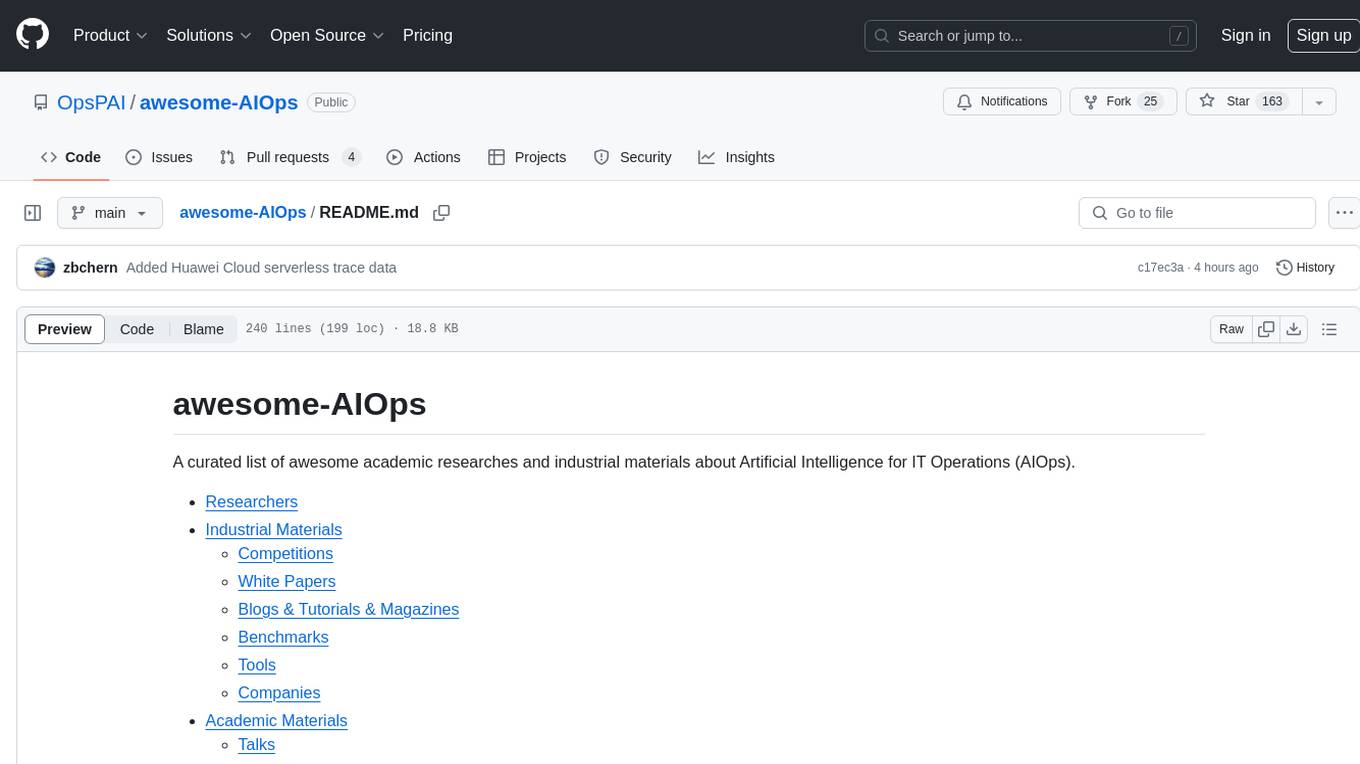
awesome-AIOps
awesome-AIOps is a curated list of academic researches and industrial materials related to Artificial Intelligence for IT Operations (AIOps). It includes resources such as competitions, white papers, blogs, tutorials, benchmarks, tools, companies, academic materials, talks, workshops, papers, and courses covering various aspects of AIOps like anomaly detection, root cause analysis, incident management, microservices, dependency tracing, and more.
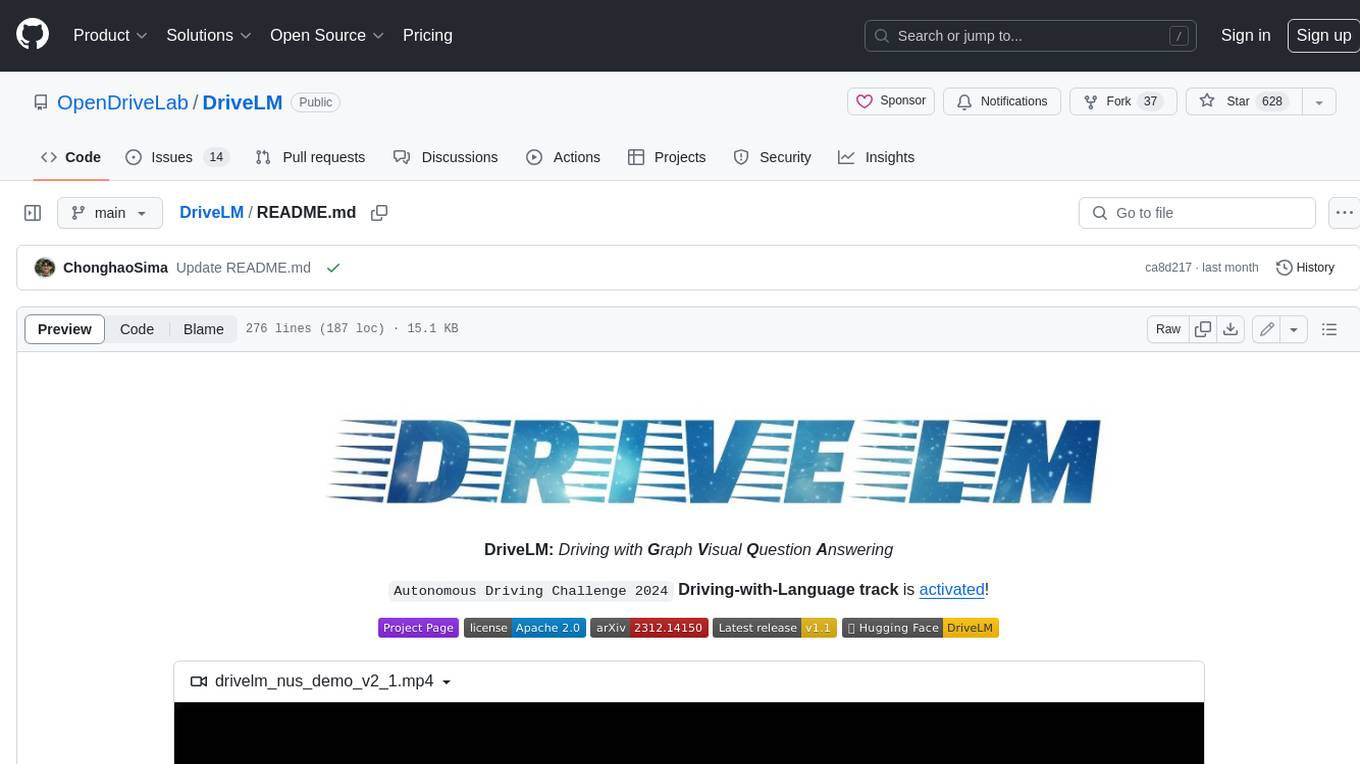
DriveLM
DriveLM is a multimodal AI model that enables autonomous driving by combining computer vision and natural language processing. It is designed to understand and respond to complex driving scenarios using visual and textual information. DriveLM can perform various tasks related to driving, such as object detection, lane keeping, and decision-making. It is trained on a massive dataset of images and text, which allows it to learn the relationships between visual cues and driving actions. DriveLM is a powerful tool that can help to improve the safety and efficiency of autonomous vehicles.
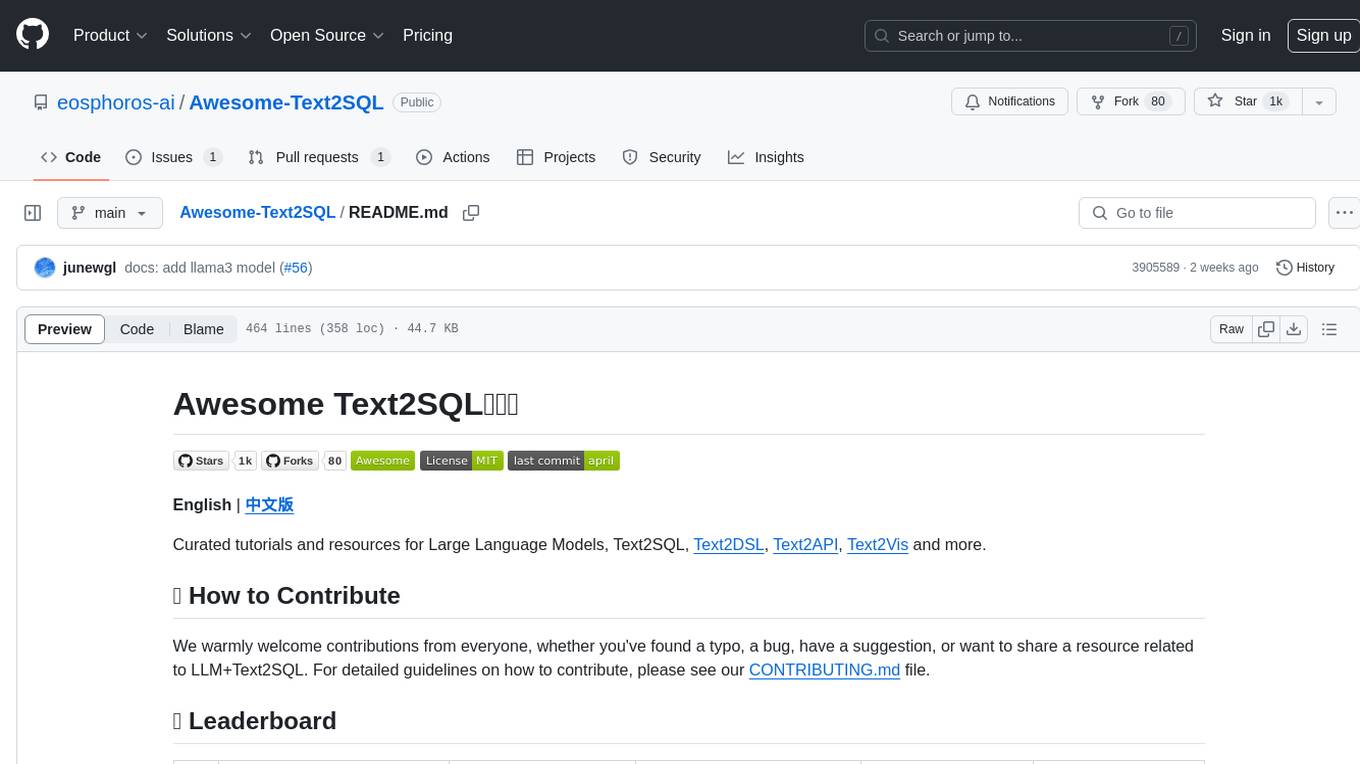
Awesome-Text2SQL
Awesome Text2SQL is a curated repository containing tutorials and resources for Large Language Models, Text2SQL, Text2DSL, Text2API, Text2Vis, and more. It provides guidelines on converting natural language questions into structured SQL queries, with a focus on NL2SQL. The repository includes information on various models, datasets, evaluation metrics, fine-tuning methods, libraries, and practice projects related to Text2SQL. It serves as a comprehensive resource for individuals interested in working with Text2SQL and related technologies.
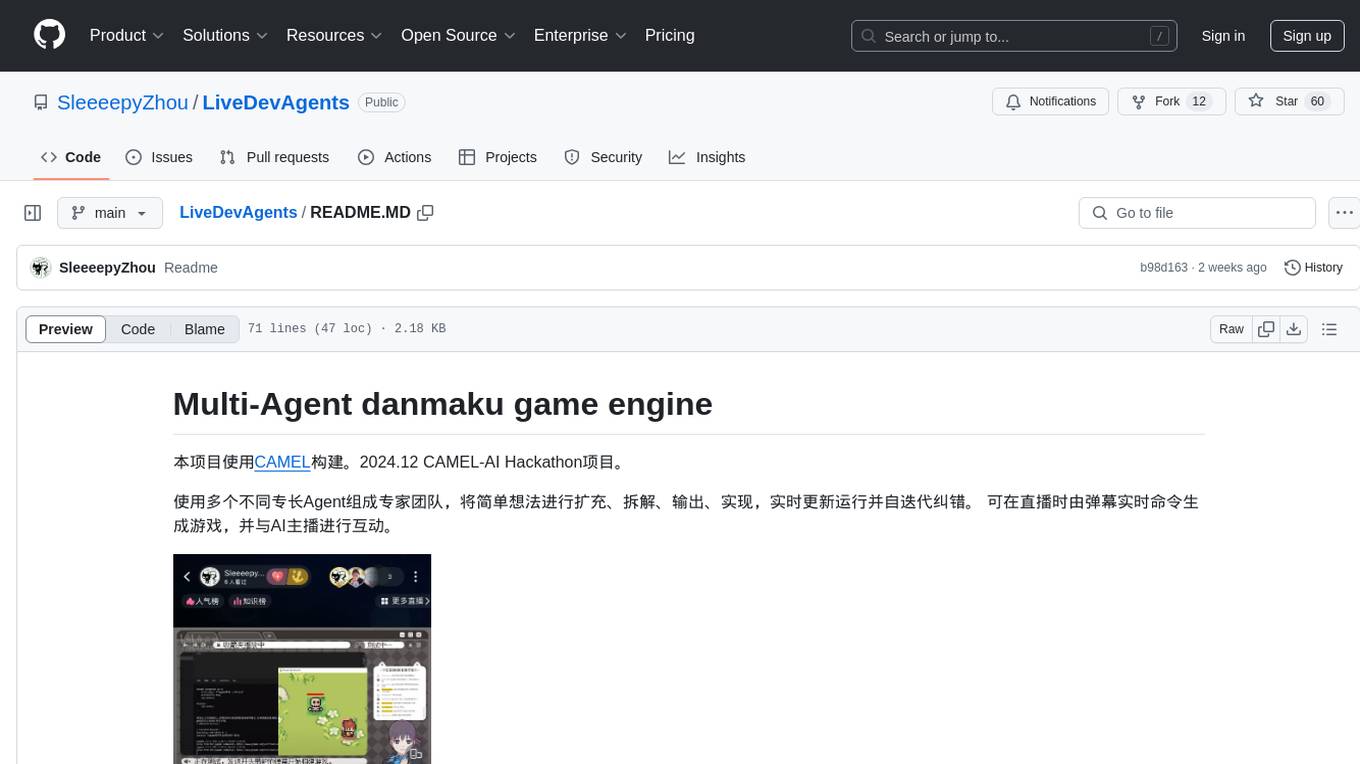
LiveDevAgents
LiveDevAgents is a multi-agent danmaku game engine built using CAMEL. It was developed for the 2024.12 CAMEL-AI Hackathon project. The engine allows for the creation of games in real-time through live bullet comments during streaming, enabling interaction with AI hosts. The project aims to expand and deconstruct simple ideas with a team of agents of different expertise, continuously updating and self-correcting during runtime. It also supports workforce enhancement, migration of anchor agents to a new framework, improvement of bullet comment processing logic, expansion of live control for more platforms, integration of art and music agents, and VR shared workspace for collaborative development.
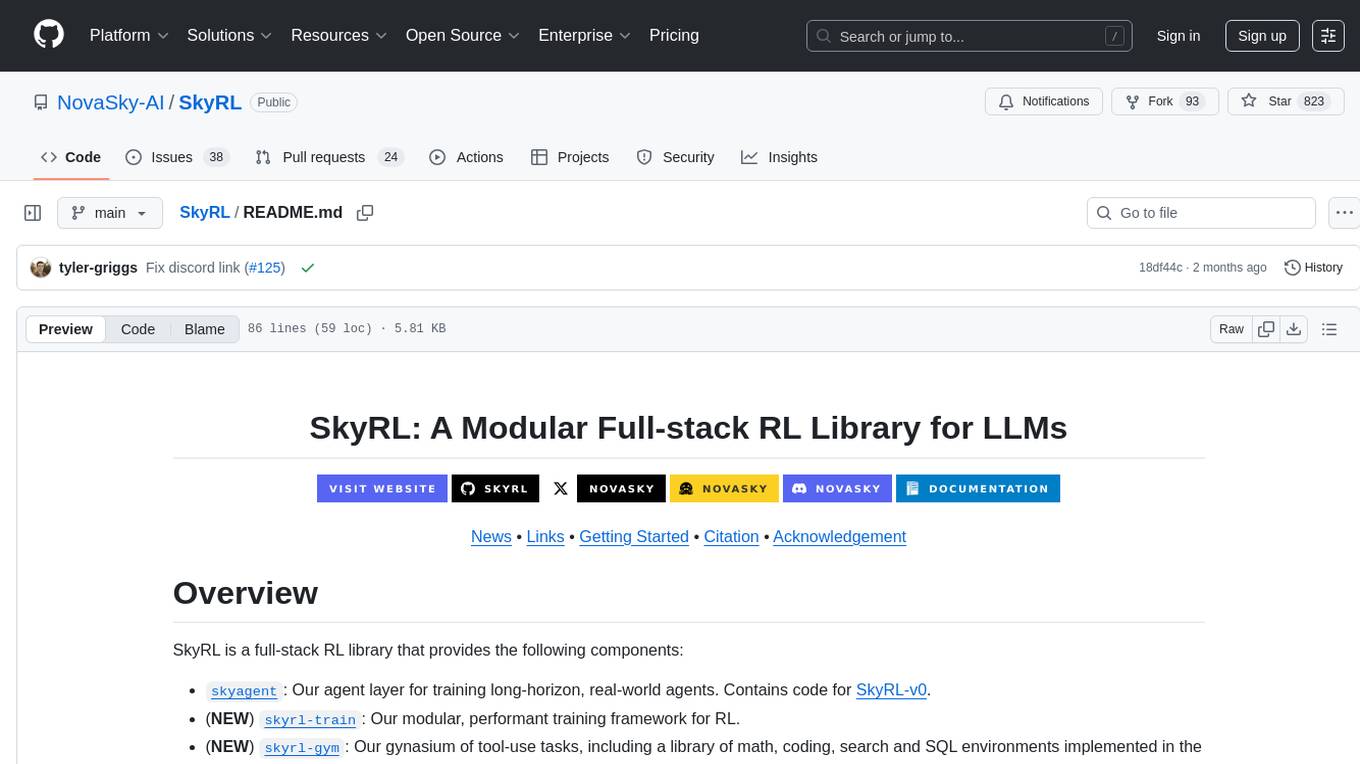
SkyRL
SkyRL is a full-stack RL library that provides components such as 'skyagent' for training long-horizon, real-world agents, 'skyrl-train' for modular RL training, and 'skyrl-gym' for a variety of tool-use tasks. It offers a library of math, coding, search, and SQL environments implemented in the Gymnasium API, optimized for multi-turn tool use LLMs on long-horizon, real-environment tasks.
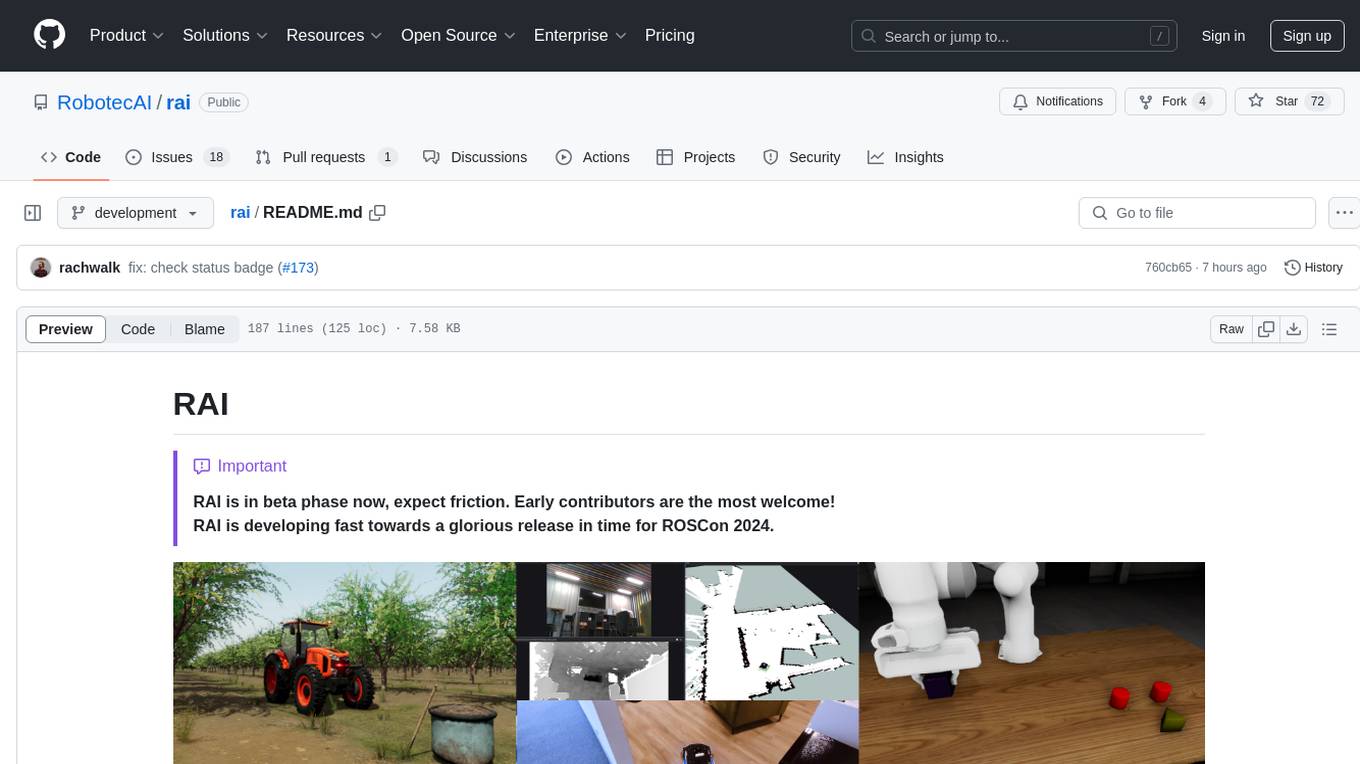
rai
RAI is a framework designed to bring general multi-agent system capabilities to robots, enhancing human interactivity, flexibility in problem-solving, and out-of-the-box AI features. It supports multi-modalities, incorporates an advanced database for agent memory, provides ROS 2-oriented tooling, and offers a comprehensive task/mission orchestrator. The framework includes features such as voice interaction, customizable robot identity, camera sensor access, reasoning through ROS logs, and integration with LangChain for AI tools. RAI aims to support various AI vendors, improve human-robot interaction, provide an SDK for developers, and offer a user interface for configuration.
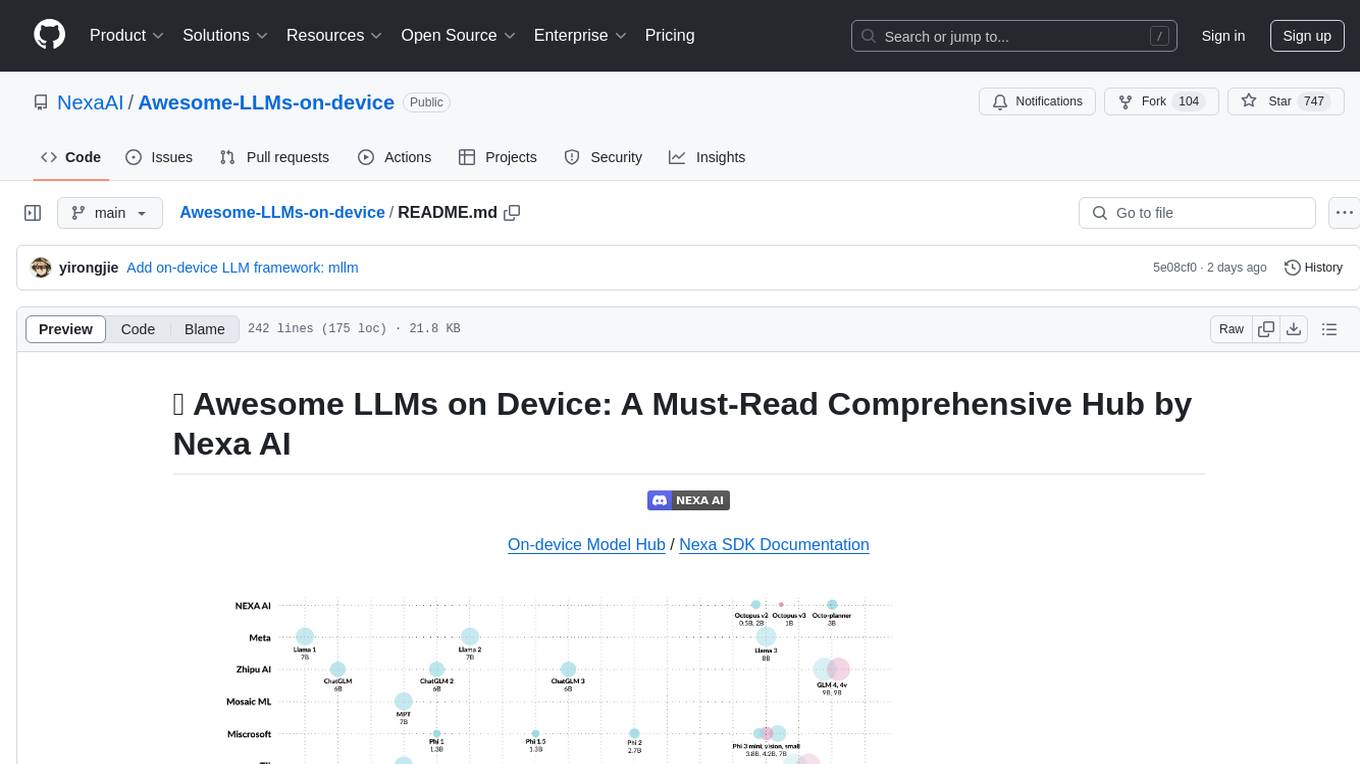
Awesome-LLMs-on-device
Welcome to the ultimate hub for on-device Large Language Models (LLMs)! This repository is your go-to resource for all things related to LLMs designed for on-device deployment. Whether you're a seasoned researcher, an innovative developer, or an enthusiastic learner, this comprehensive collection of cutting-edge knowledge is your gateway to understanding, leveraging, and contributing to the exciting world of on-device LLMs.
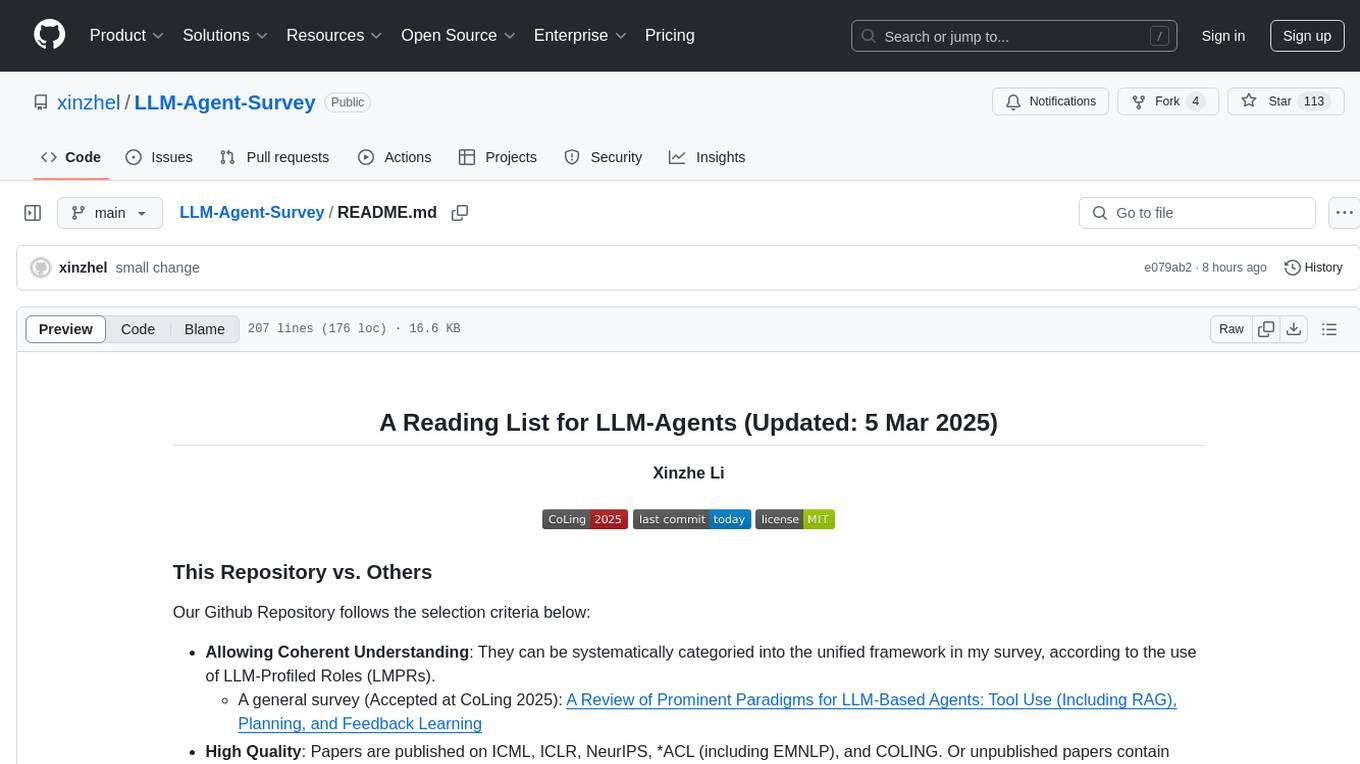
LLM-Agent-Survey
LLM-Agent-Survey is a comprehensive repository that provides a curated list of papers related to Large Language Model (LLM) agents. The repository categorizes papers based on LLM-Profiled Roles and includes high-quality publications from prestigious conferences and journals. It aims to offer a systematic understanding of LLM-based agents, covering topics such as tool use, planning, and feedback learning. The repository also includes unpublished papers with insightful analysis and novelty, marked for future updates. Users can explore a wide range of surveys, tool use cases, planning workflows, and benchmarks related to LLM agents.
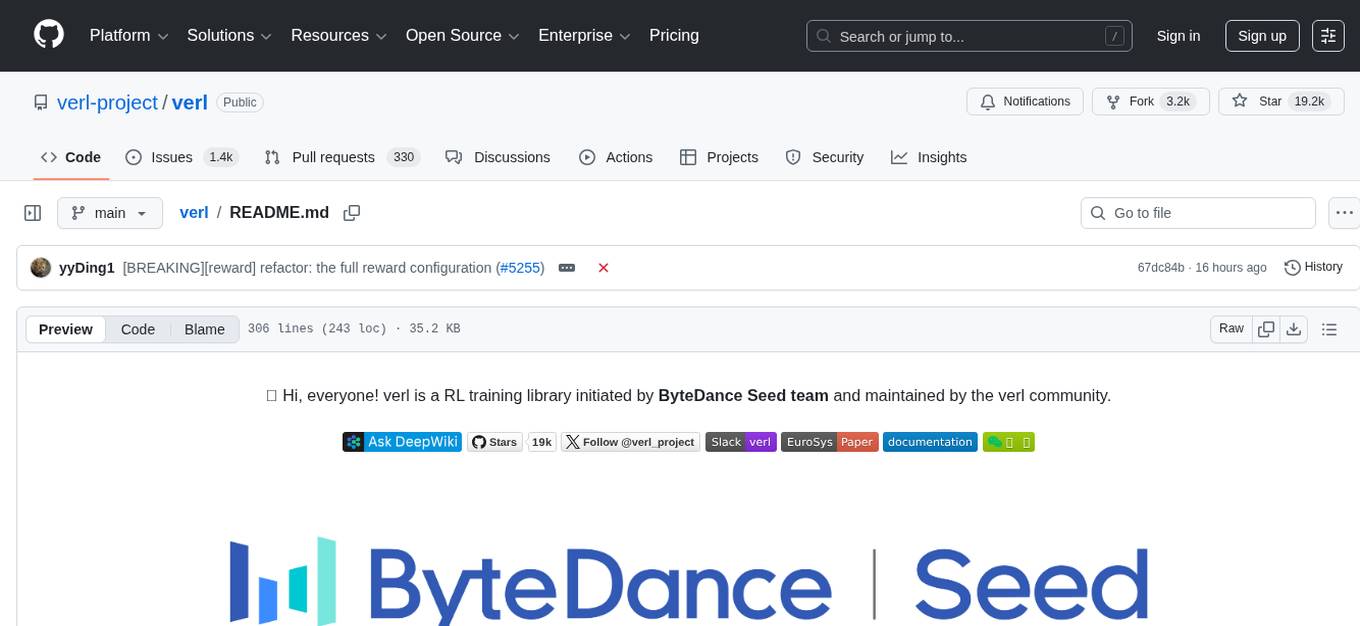
verl
verl is a flexible and efficient RL training library for large language models (LLMs). It offers easy extension of diverse RL algorithms, seamless integration with existing LLM infra, flexible device mapping, and integration with popular Hugging Face models. The library provides state-of-the-art throughput, efficient actor model resharding, and supports various RL algorithms like PPO, GRPO, and more. It also supports model-based and function-based rewards for tasks like math and coding, vision-language models, and multi-modal RL. verl is used for tasks like training large language models, reasoning tasks, reinforcement learning with diverse algorithms, and multi-modal RL.
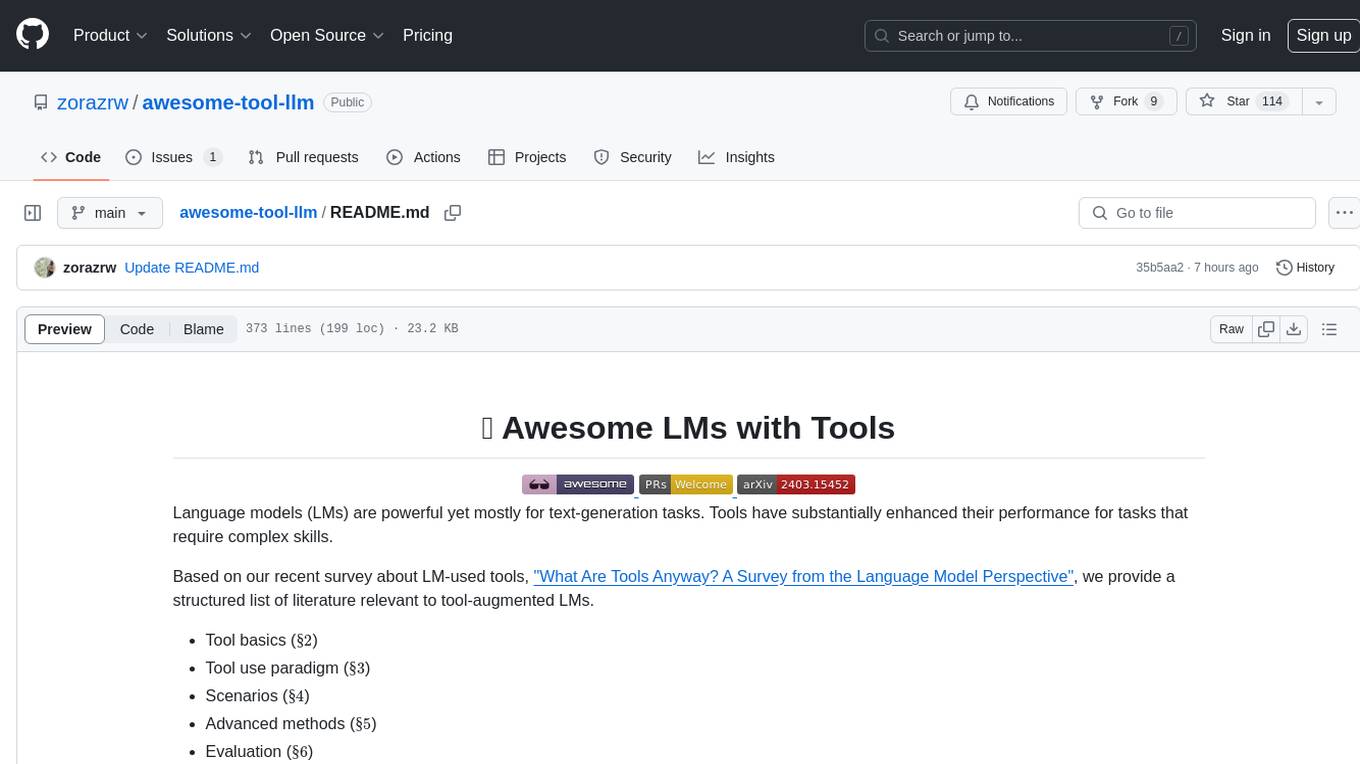
awesome-tool-llm
This repository focuses on exploring tools that enhance the performance of language models for various tasks. It provides a structured list of literature relevant to tool-augmented language models, covering topics such as tool basics, tool use paradigm, scenarios, advanced methods, and evaluation. The repository includes papers, preprints, and books that discuss the use of tools in conjunction with language models for tasks like reasoning, question answering, mathematical calculations, accessing knowledge, interacting with the world, and handling non-textual modalities.
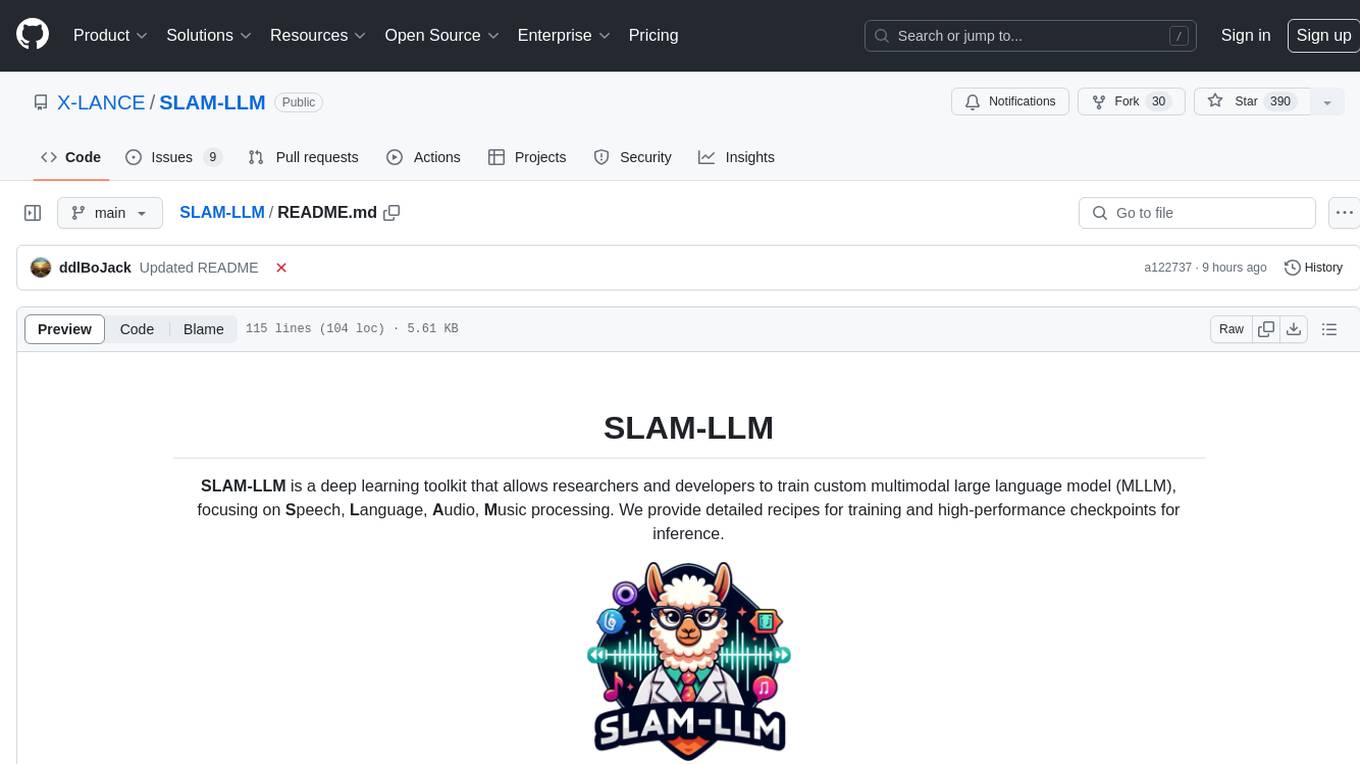
SLAM-LLM
SLAM-LLM is a deep learning toolkit for training custom multimodal large language models (MLLM) focusing on speech, language, audio, and music processing. It provides detailed recipes for training and high-performance checkpoints for inference. The toolkit supports various tasks such as automatic speech recognition (ASR), text-to-speech (TTS), visual speech recognition (VSR), automated audio captioning (AAC), spatial audio understanding, and music caption (MC). Users can easily extend to new models and tasks, utilize mixed precision training for faster training with less GPU memory, and perform multi-GPU training with data and model parallelism. Configuration is flexible based on Hydra and dataclass, allowing different configuration methods.
For similar tasks

AI-System-School
AI System School is a curated list of research in machine learning systems, focusing on ML/DL infra, LLM infra, domain-specific infra, ML/LLM conferences, and general resources. It provides resources such as data processing, training systems, video systems, autoML systems, and more. The repository aims to help users navigate the landscape of AI systems and machine learning infrastructure, offering insights into conferences, surveys, books, videos, courses, and blogs related to the field.
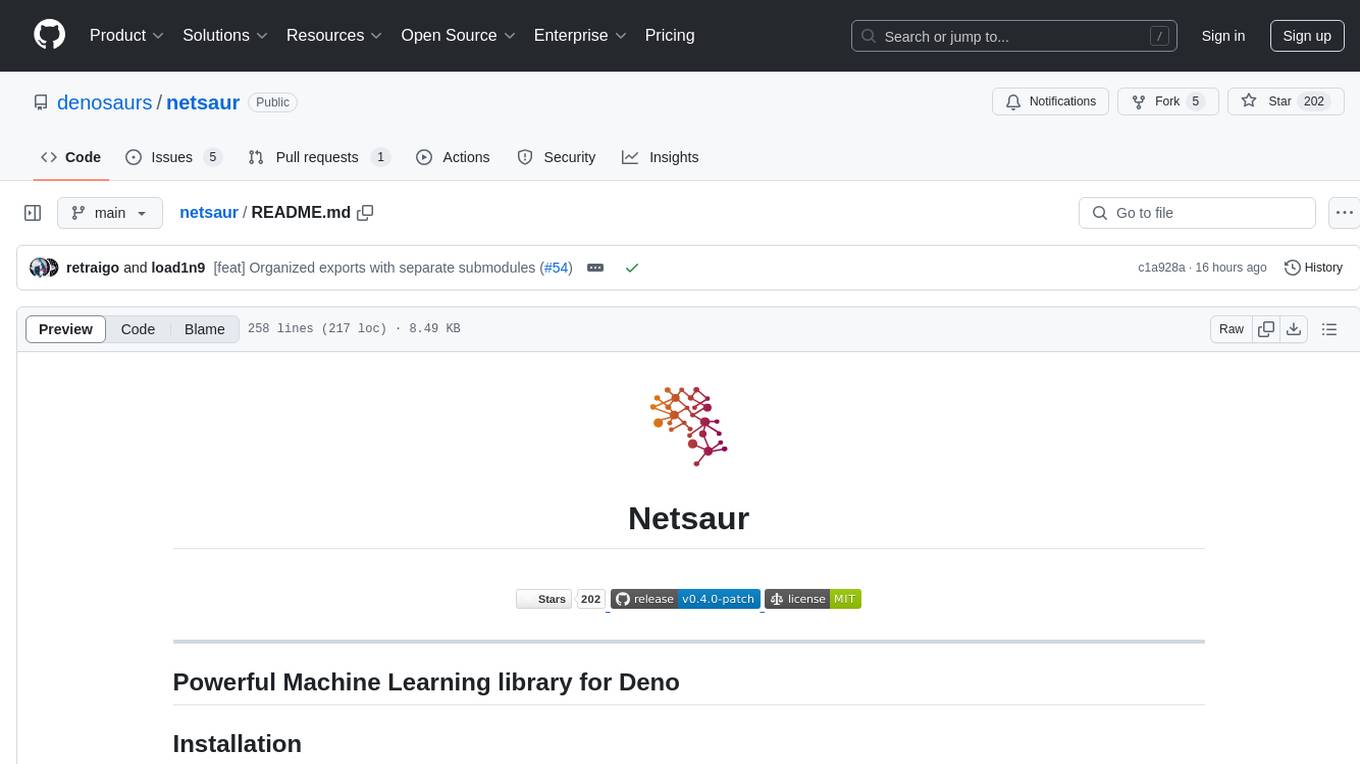
netsaur
Netsaur is a powerful machine learning library for Deno, offering a lightweight and easy-to-use neural network solution. It is blazingly fast and efficient, providing a simple API for creating and training neural networks. Netsaur can run on both CPU and GPU, making it suitable for serverless environments. With Netsaur, users can quickly build and deploy machine learning models for various applications with minimal dependencies. This library is perfect for both beginners and experienced machine learning practitioners.
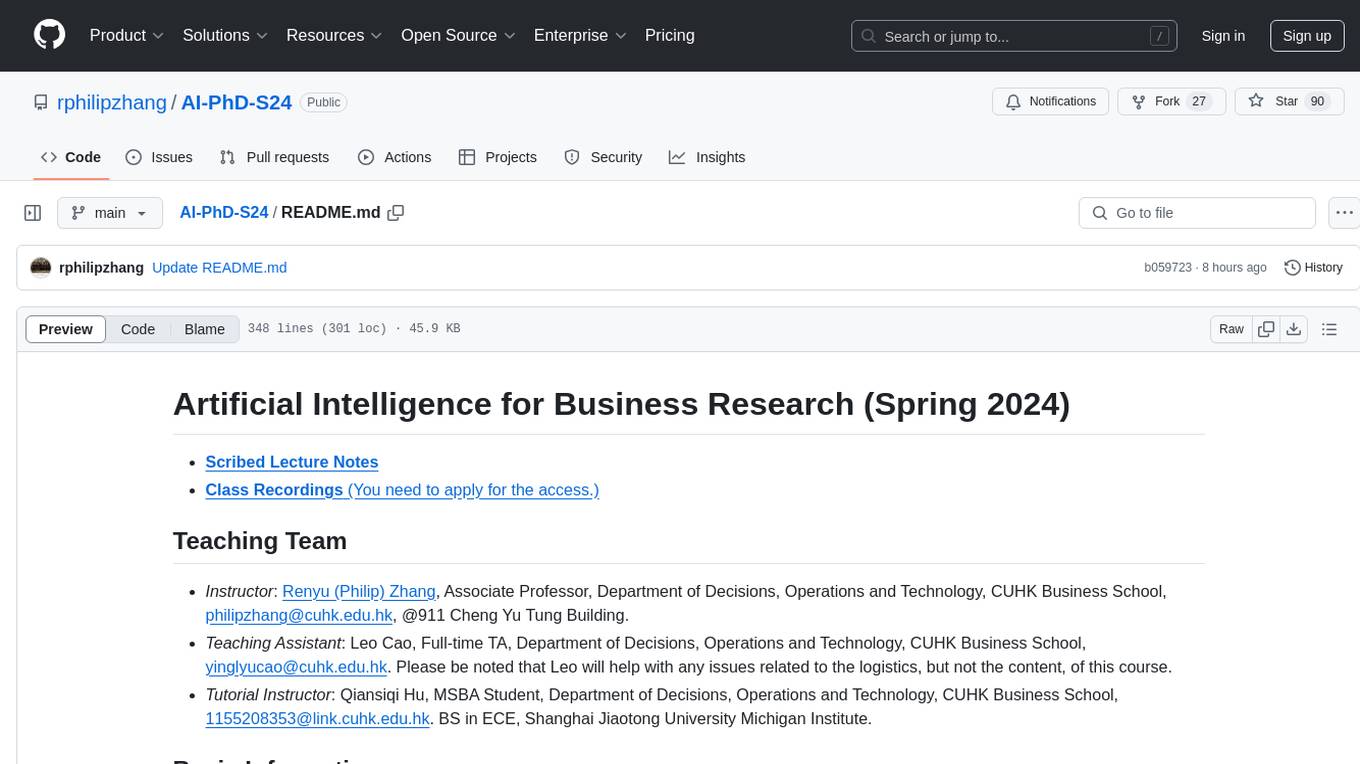
AI-PhD-S24
AI-PhD-S24 is a mono-repo for the PhD course 'AI for Business Research' at CUHK Business School in Spring 2024. The course aims to provide a basic understanding of machine learning and artificial intelligence concepts/methods used in business research, showcase how ML/AI is utilized in business research, and introduce state-of-the-art AI/ML technologies. The course includes scribed lecture notes, class recordings, and covers topics like AI/ML fundamentals, DL, NLP, CV, unsupervised learning, and diffusion models.
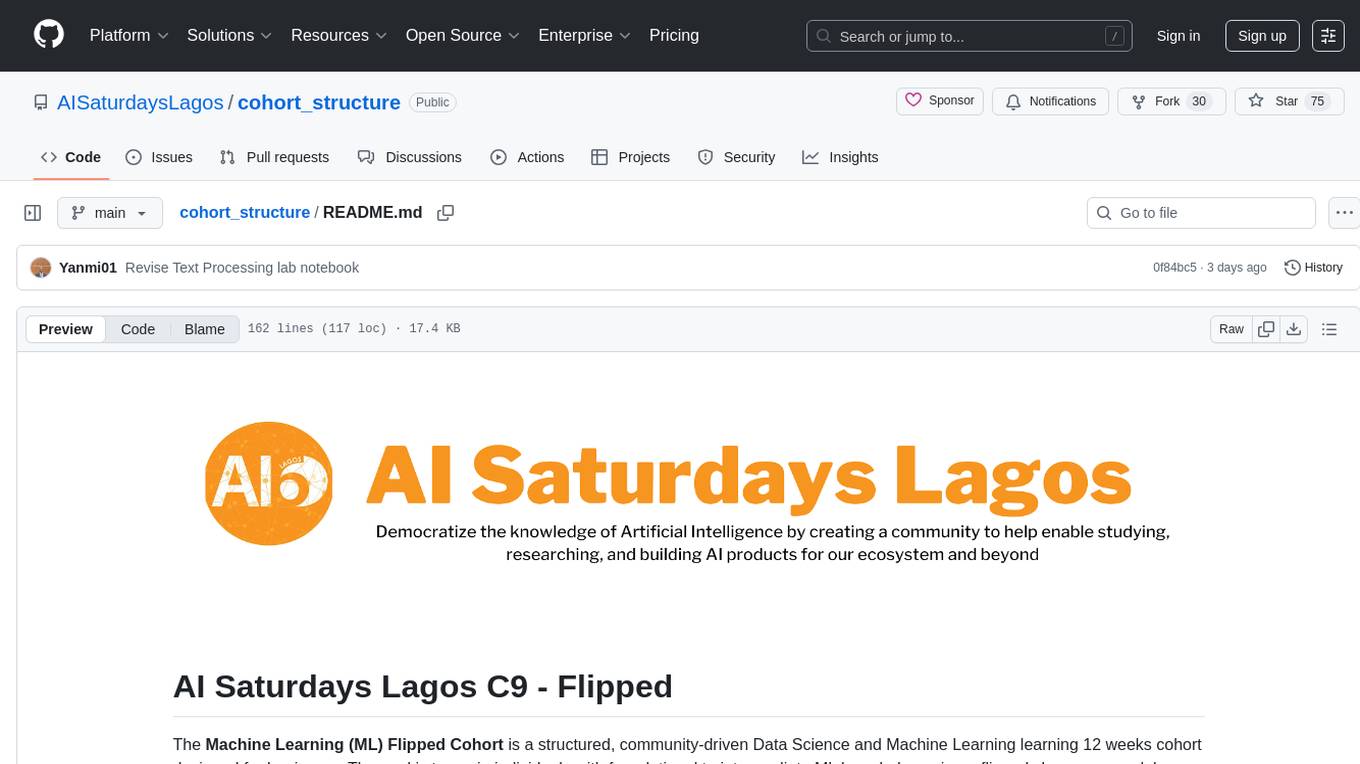
cohort_structure
The Machine Learning (ML) Flipped Cohort is a 12-week structured program designed for beginners to gain foundational to intermediate ML knowledge. Participants consume pre-recorded content during the week and engage in weekly community discussions. The program covers topics such as Python, data science foundations, databases, math for ML, text processing, linear regression, non-linear modeling, deep learning basics, and more. Participants work on capstone projects and are assessed through Google Forms. Certification requires minimum attendance, assessment scores, and participation in the final project. The cohort provides a supportive learning environment with mentorship and community interaction.
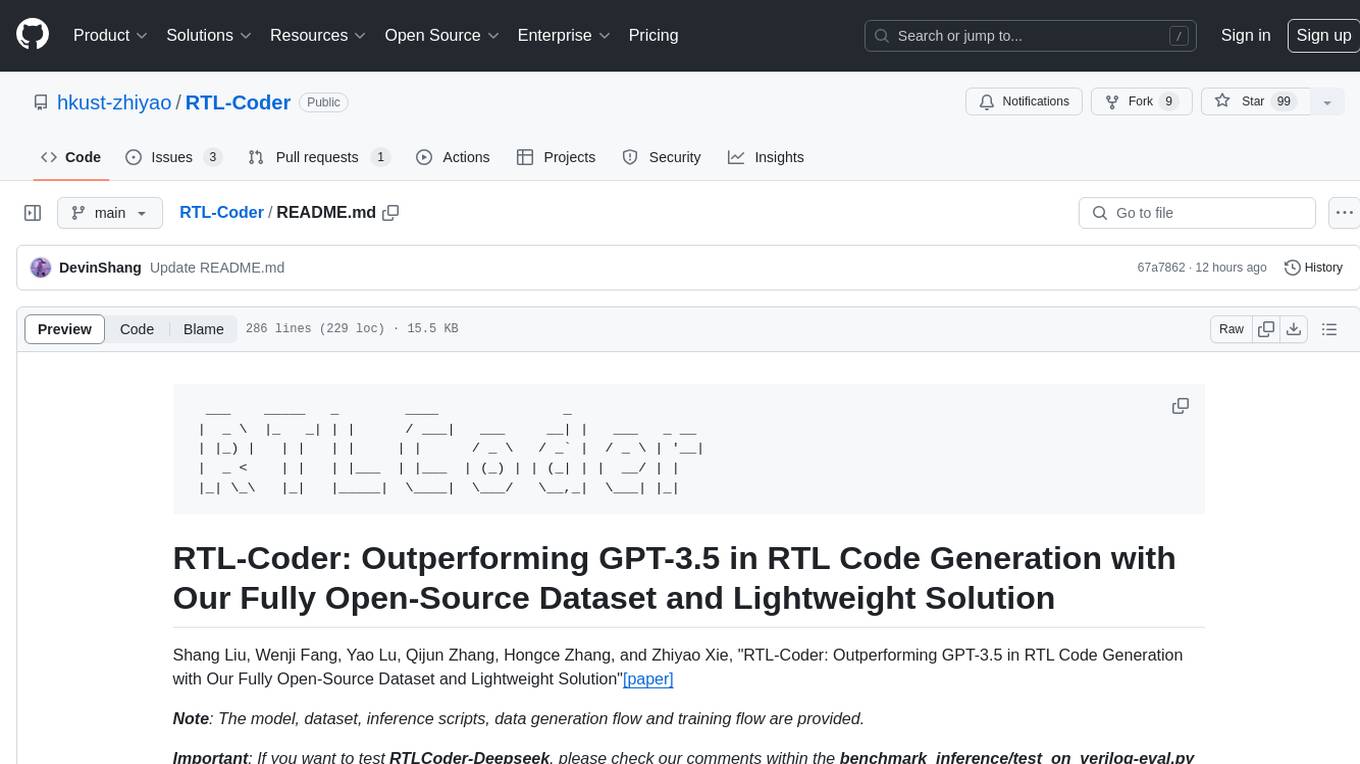
RTL-Coder
RTL-Coder is a tool designed to outperform GPT-3.5 in RTL code generation by providing a fully open-source dataset and a lightweight solution. It targets Verilog code generation and offers an automated flow to generate a large labeled dataset with over 27,000 diverse Verilog design problems and answers. The tool addresses the data availability challenge in IC design-related tasks and can be used for various applications beyond LLMs. The tool includes four RTL code generation models available on the HuggingFace platform, each with specific features and performance characteristics. Additionally, RTL-Coder introduces a new LLM training scheme based on code quality feedback to further enhance model performance and reduce GPU memory consumption.
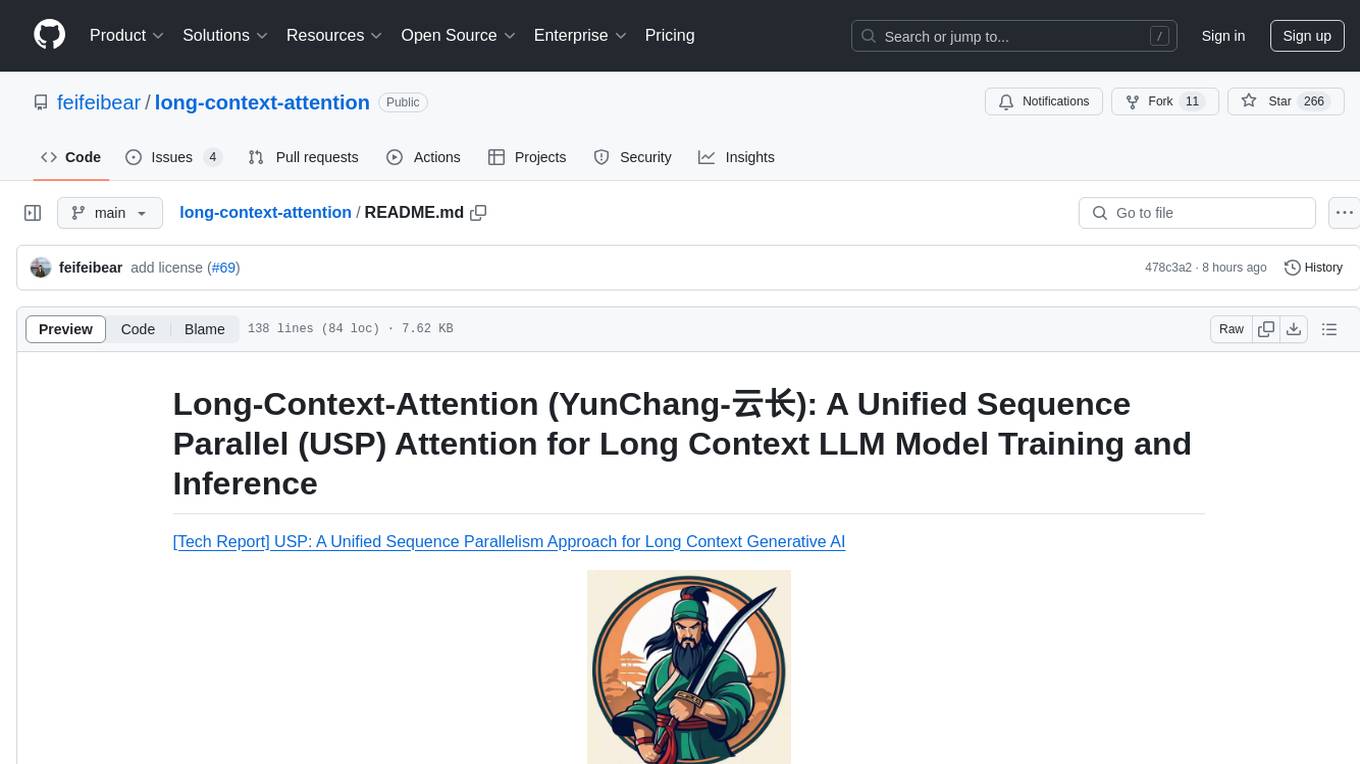
long-context-attention
Long-Context-Attention (YunChang) is a unified sequence parallel approach that combines the strengths of DeepSpeed-Ulysses-Attention and Ring-Attention to provide a versatile and high-performance solution for long context LLM model training and inference. It addresses the limitations of both methods by offering no limitation on the number of heads, compatibility with advanced parallel strategies, and enhanced performance benchmarks. The tool is verified in Megatron-LM and offers best practices for 4D parallelism, making it suitable for various attention mechanisms and parallel computing advancements.
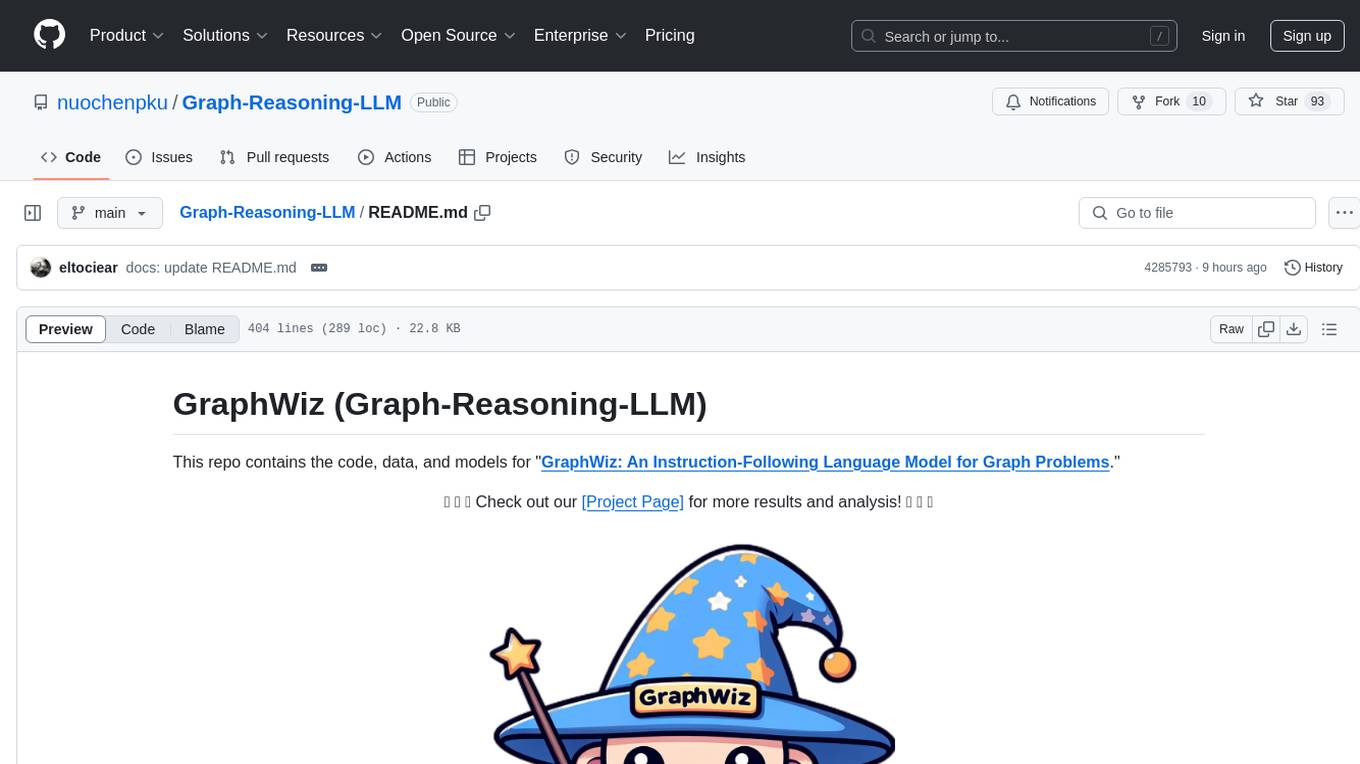
Graph-Reasoning-LLM
This repository, GraphWiz, focuses on developing an instruction-following Language Model (LLM) for solving graph problems. It includes GraphWiz LLMs with strong graph problem-solving abilities, GraphInstruct dataset with over 72.5k training samples across nine graph problem tasks, and models like GPT-4 and Mistral-7B for comparison. The project aims to map textual descriptions of graphs and structures to solve various graph problems explicitly in natural language.
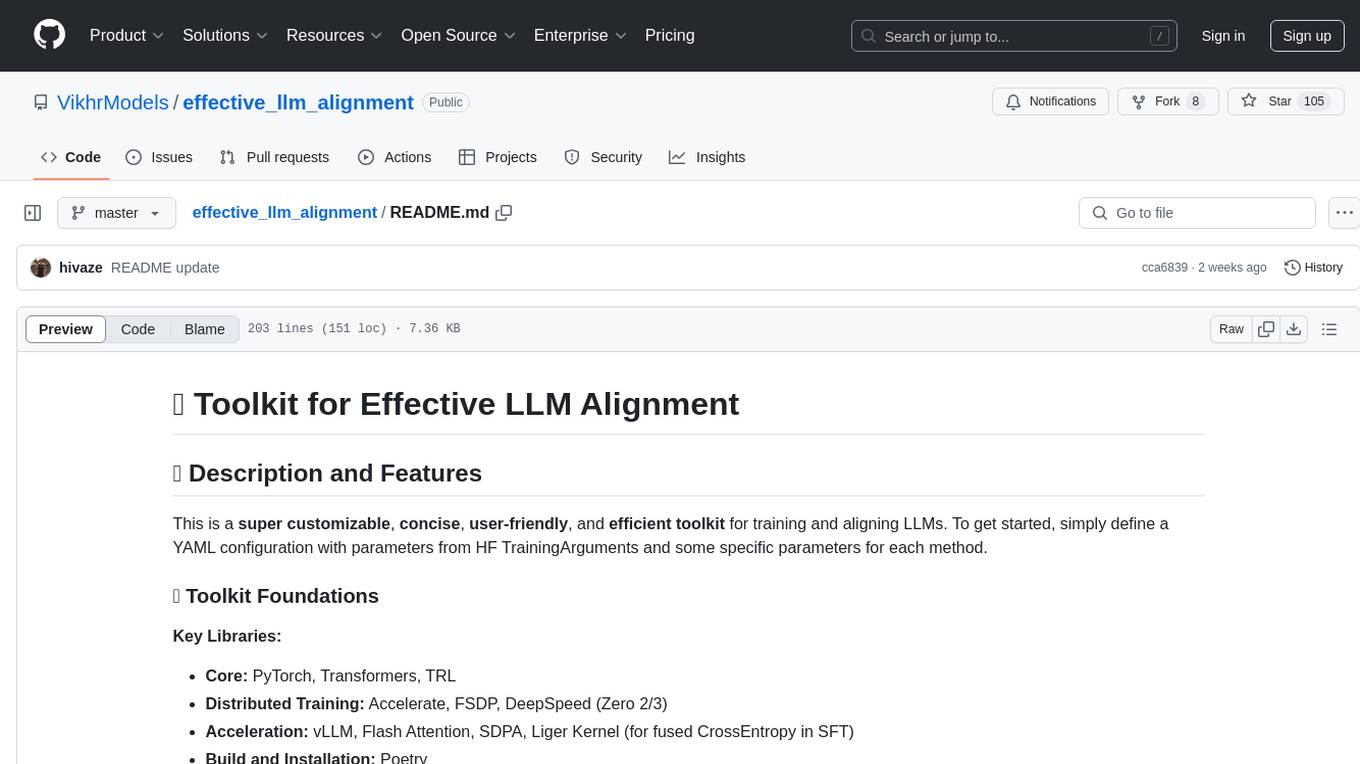
effective_llm_alignment
This is a super customizable, concise, user-friendly, and efficient toolkit for training and aligning LLMs. It provides support for various methods such as SFT, Distillation, DPO, ORPO, CPO, SimPO, SMPO, Non-pair Reward Modeling, Special prompts basket format, Rejection Sampling, Scoring using RM, Effective FAISS Map-Reduce Deduplication, LLM scoring using RM, NER, CLIP, Classification, and STS. The toolkit offers key libraries like PyTorch, Transformers, TRL, Accelerate, FSDP, DeepSpeed, and tools for result logging with wandb or clearml. It allows mixing datasets, generation and logging in wandb/clearml, vLLM batched generation, and aligns models using the SMPO method.
For similar jobs
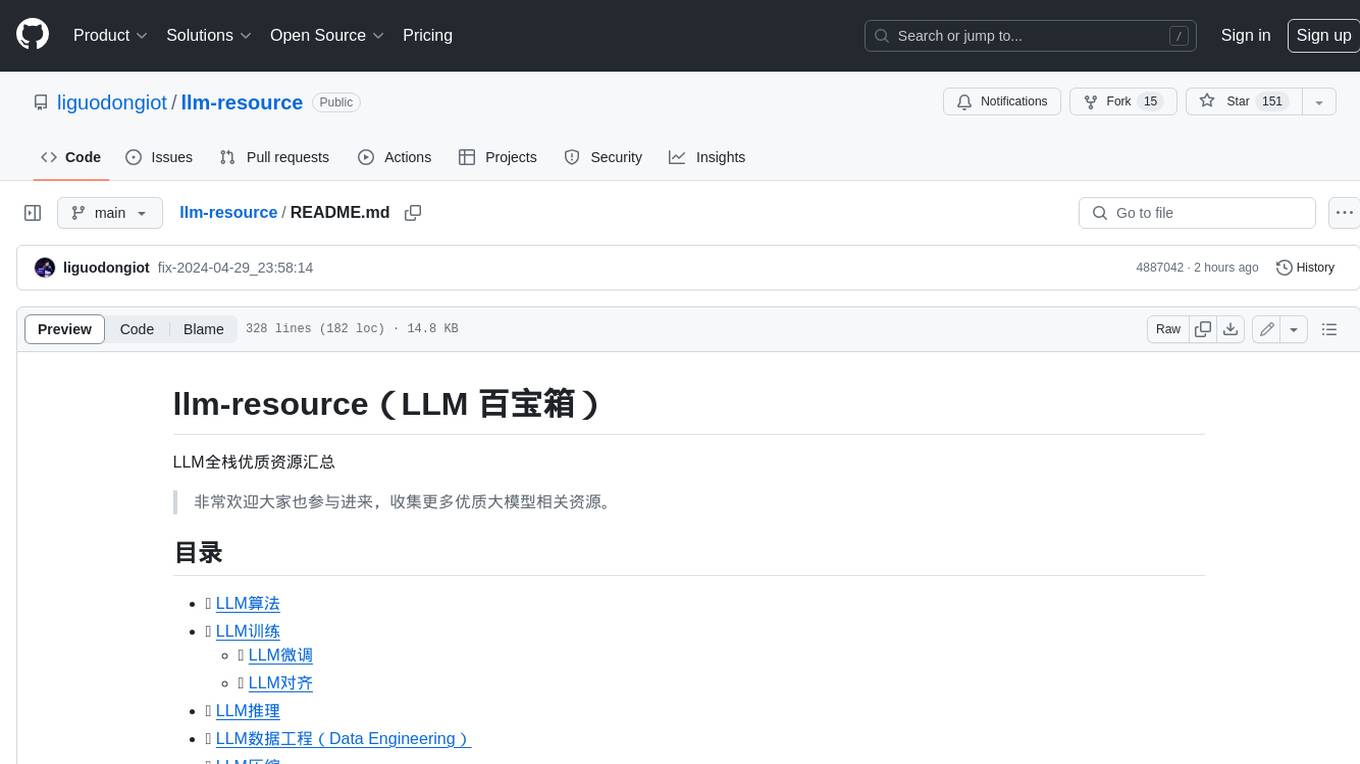
llm-resource
llm-resource is a comprehensive collection of high-quality resources for Large Language Models (LLM). It covers various aspects of LLM including algorithms, training, fine-tuning, alignment, inference, data engineering, compression, evaluation, prompt engineering, AI frameworks, AI basics, AI infrastructure, AI compilers, LLM application development, LLM operations, AI systems, and practical implementations. The repository aims to gather and share valuable resources related to LLM for the community to benefit from.
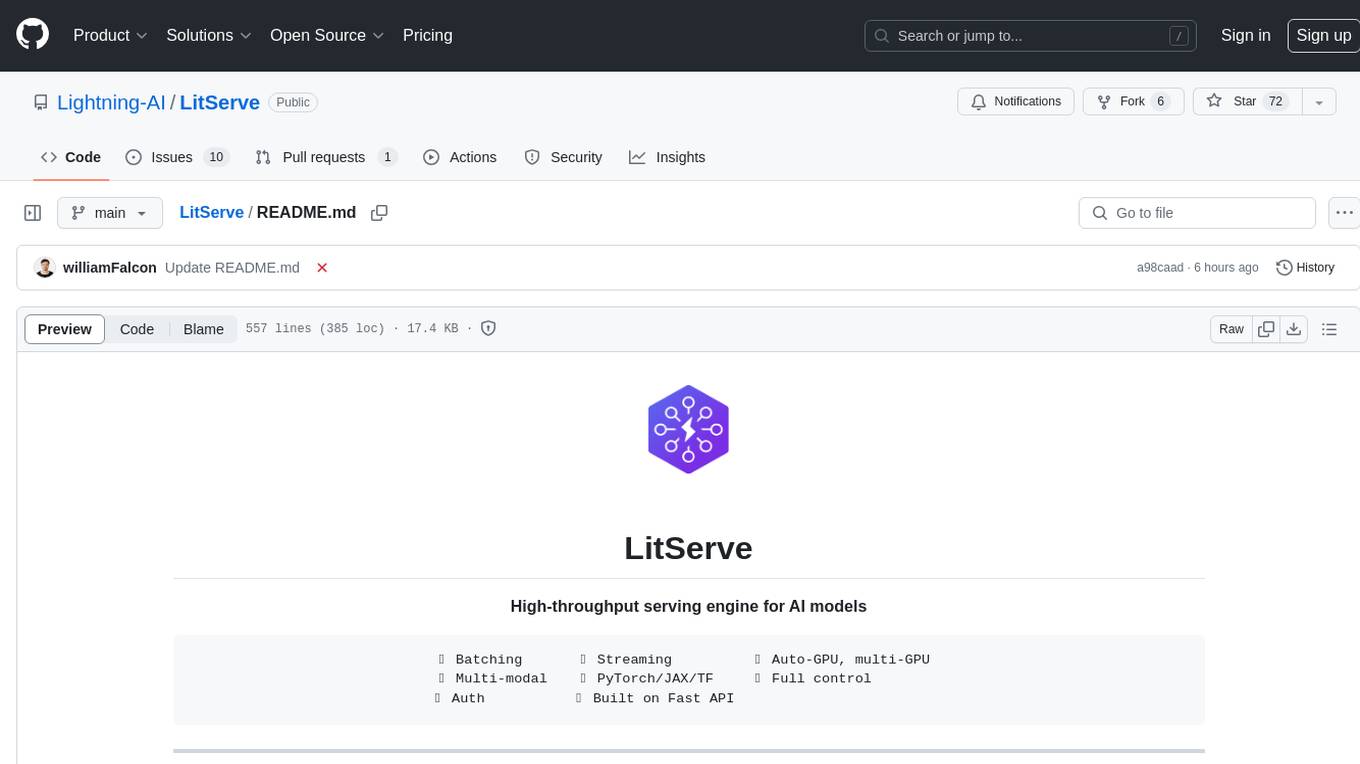
LitServe
LitServe is a high-throughput serving engine designed for deploying AI models at scale. It generates an API endpoint for models, handles batching, streaming, and autoscaling across CPU/GPUs. LitServe is built for enterprise scale with a focus on minimal, hackable code-base without bloat. It supports various model types like LLMs, vision, time-series, and works with frameworks like PyTorch, JAX, Tensorflow, and more. The tool allows users to focus on model performance rather than serving boilerplate, providing full control and flexibility.
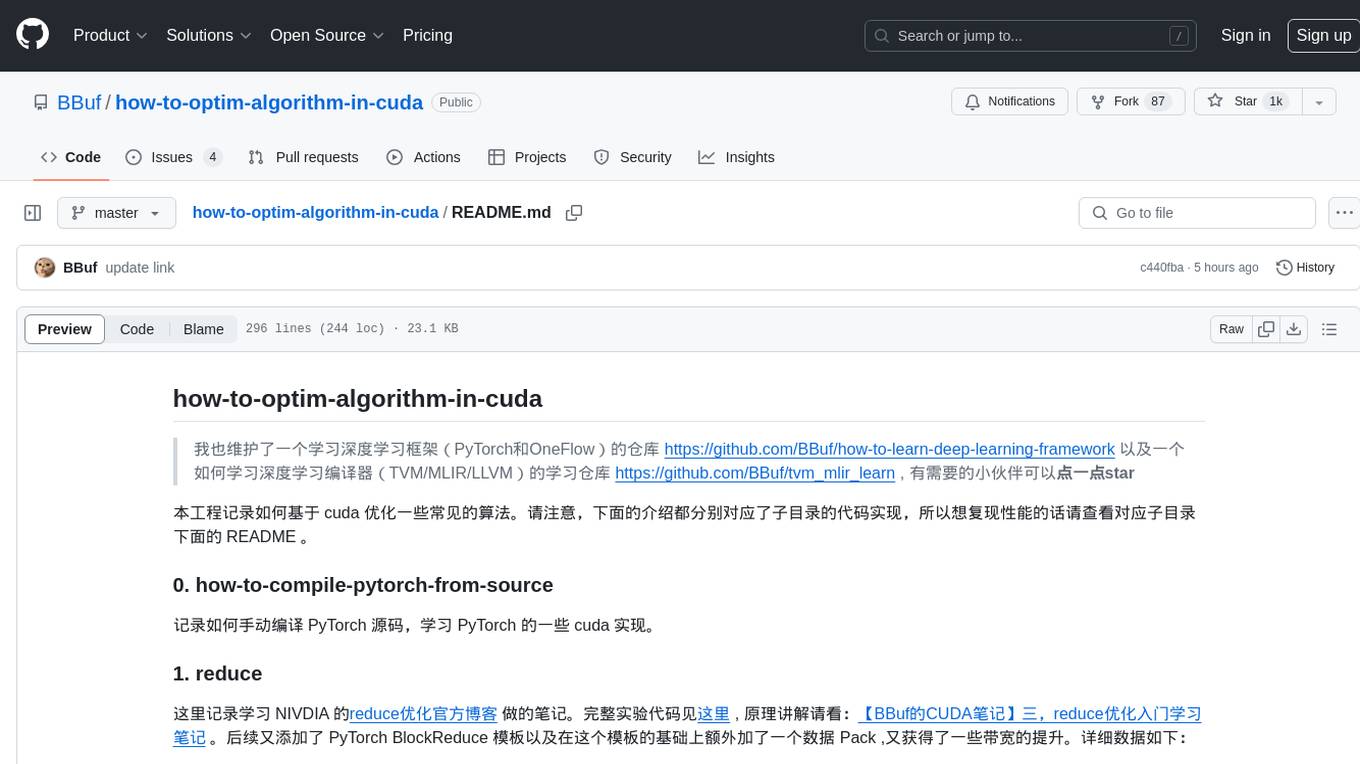
how-to-optim-algorithm-in-cuda
This repository documents how to optimize common algorithms based on CUDA. It includes subdirectories with code implementations for specific optimizations. The optimizations cover topics such as compiling PyTorch from source, NVIDIA's reduce optimization, OneFlow's elementwise template, fast atomic add for half data types, upsample nearest2d optimization in OneFlow, optimized indexing in PyTorch, OneFlow's softmax kernel, linear attention optimization, and more. The repository also includes learning resources related to deep learning frameworks, compilers, and optimization techniques.
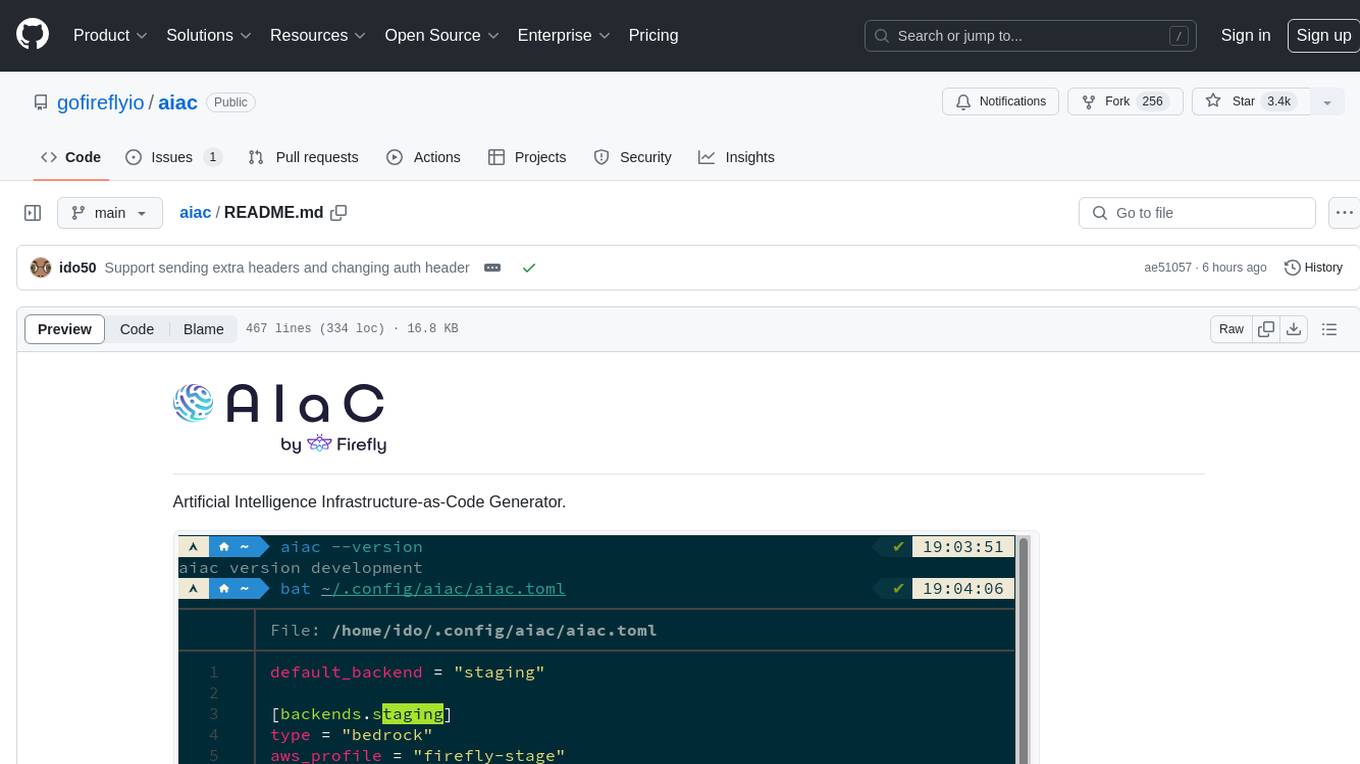
aiac
AIAC is a library and command line tool to generate Infrastructure as Code (IaC) templates, configurations, utilities, queries, and more via LLM providers such as OpenAI, Amazon Bedrock, and Ollama. Users can define multiple 'backends' targeting different LLM providers and environments using a simple configuration file. The tool allows users to ask a model to generate templates for different scenarios and composes an appropriate request to the selected provider, storing the resulting code to a file and/or printing it to standard output.
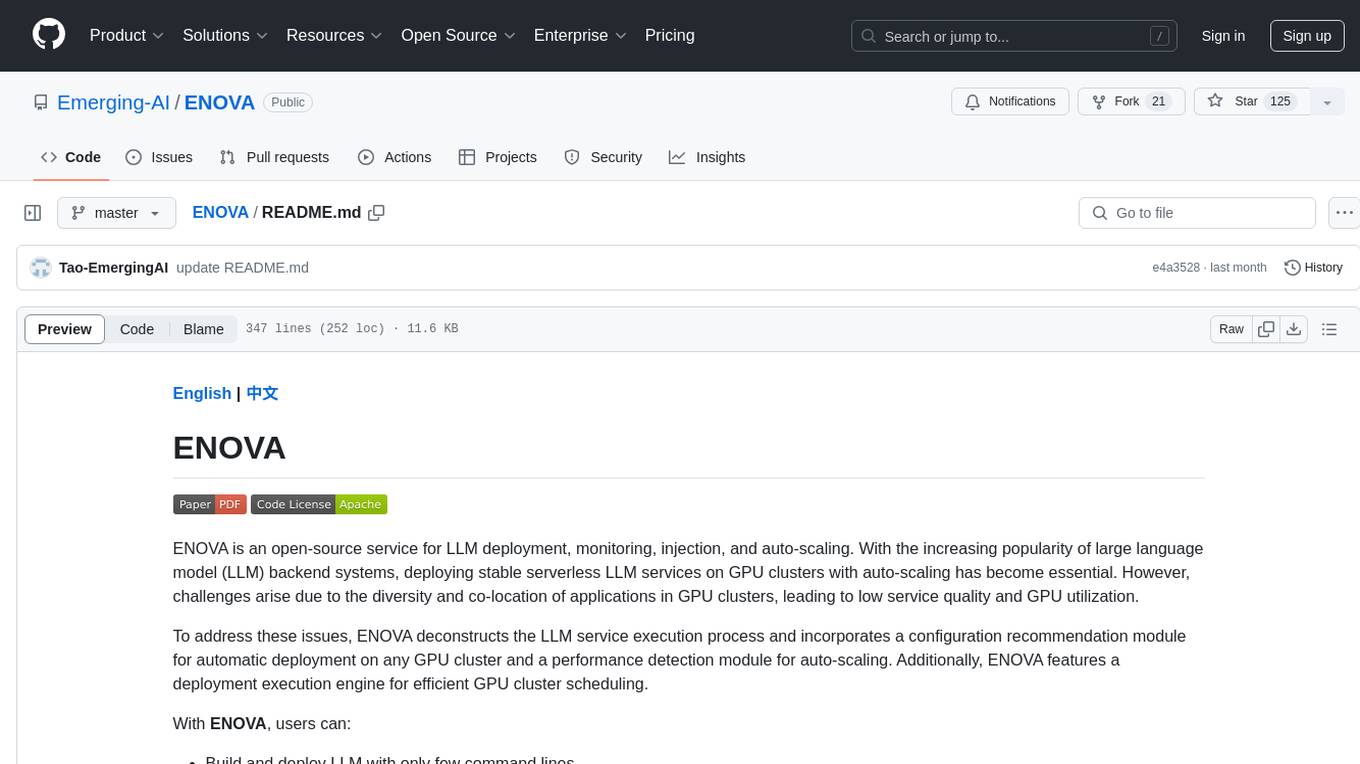
ENOVA
ENOVA is an open-source service for Large Language Model (LLM) deployment, monitoring, injection, and auto-scaling. It addresses challenges in deploying stable serverless LLM services on GPU clusters with auto-scaling by deconstructing the LLM service execution process and providing configuration recommendations and performance detection. Users can build and deploy LLM with few command lines, recommend optimal computing resources, experience LLM performance, observe operating status, achieve load balancing, and more. ENOVA ensures stable operation, cost-effectiveness, efficiency, and strong scalability of LLM services.
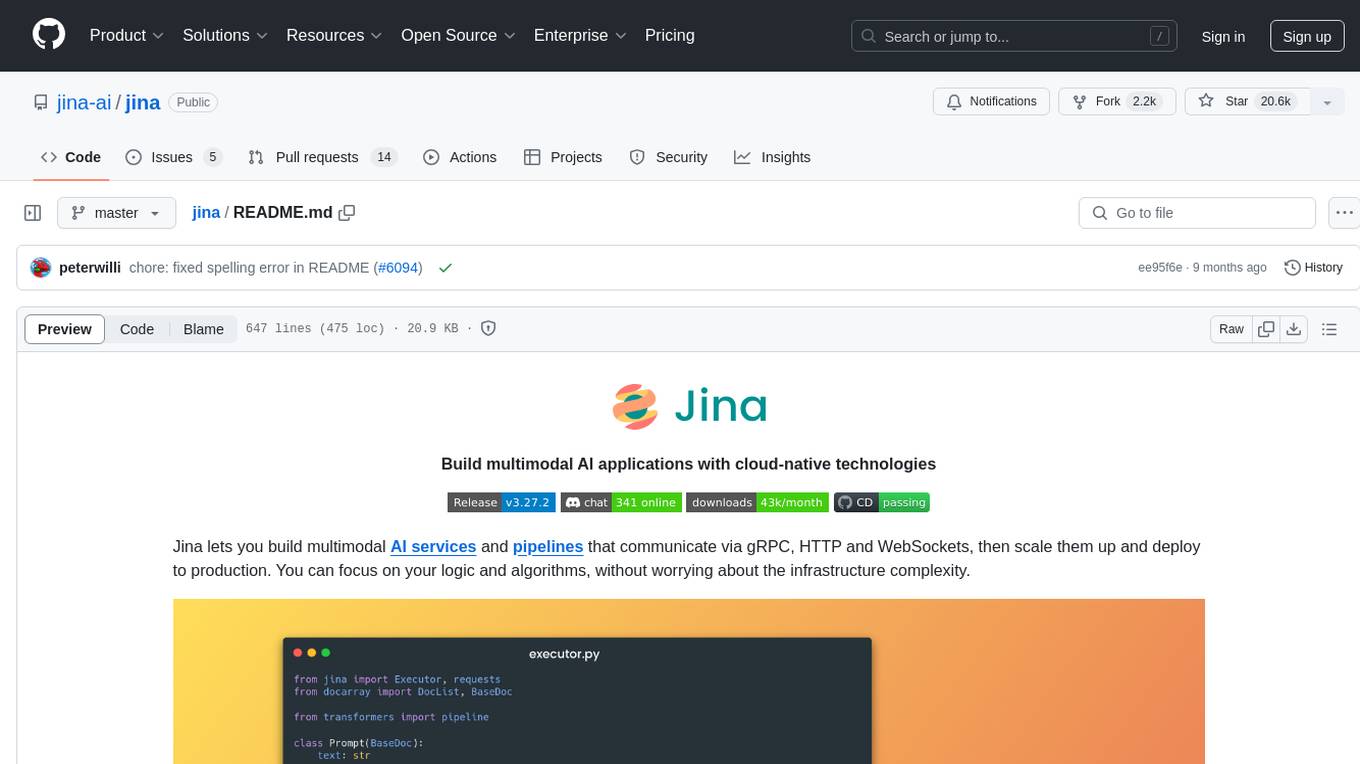
jina
Jina is a tool that allows users to build multimodal AI services and pipelines using cloud-native technologies. It provides a Pythonic experience for serving ML models and transitioning from local deployment to advanced orchestration frameworks like Docker-Compose, Kubernetes, or Jina AI Cloud. Users can build and serve models for any data type and deep learning framework, design high-performance services with easy scaling, serve LLM models while streaming their output, integrate with Docker containers via Executor Hub, and host on CPU/GPU using Jina AI Cloud. Jina also offers advanced orchestration and scaling capabilities, a smooth transition to the cloud, and easy scalability and concurrency features for applications. Users can deploy to their own cloud or system with Kubernetes and Docker Compose integration, and even deploy to JCloud for autoscaling and monitoring.
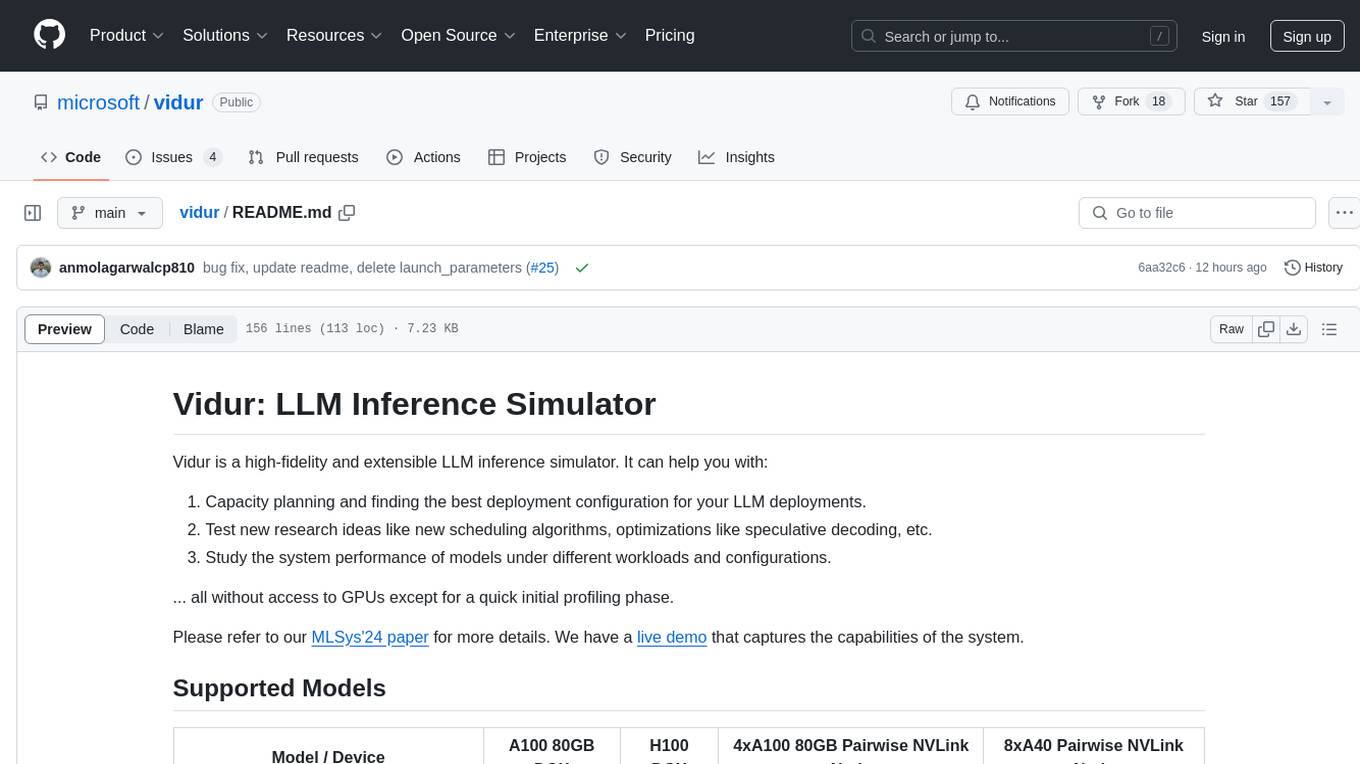
vidur
Vidur is a high-fidelity and extensible LLM inference simulator designed for capacity planning, deployment configuration optimization, testing new research ideas, and studying system performance of models under different workloads and configurations. It supports various models and devices, offers chrome trace exports, and can be set up using mamba, venv, or conda. Users can run the simulator with various parameters and monitor metrics using wandb. Contributions are welcome, subject to a Contributor License Agreement and adherence to the Microsoft Open Source Code of Conduct.

AI-System-School
AI System School is a curated list of research in machine learning systems, focusing on ML/DL infra, LLM infra, domain-specific infra, ML/LLM conferences, and general resources. It provides resources such as data processing, training systems, video systems, autoML systems, and more. The repository aims to help users navigate the landscape of AI systems and machine learning infrastructure, offering insights into conferences, surveys, books, videos, courses, and blogs related to the field.







